Why contribute to open source?
A presentation at All Things Open RTP Meetup by Tobie Langel

Why contribute to open source? The strategic benefits of contributing to open source for businesses & individuals Tobie Langel (@tobie) Principal, UnlockOpen

Original motivations ● Intrinsic motivations. ● “Scratching your own itch.” ● Hobbyist and hacker culture. ● Focused on building tools for their personal usage. ● Reputation as a currency (for sharing). ● Practitioners are a somewhat homogeneous group.

What changed? ● Massive growth of tech. ● Massive adoption of open source.

The open source journey

Which basically translates to ● Ignore: “Open source is for hippies, we’re doing real business here.” ● Consume: “Open source is ‘free.’ Let’s use it!” ● Comply: “Oh, there’s a license? Let’s get a lawyer.” ● Contribute: “Might as well upstream that fix so we don’t have to maintain a fork.” ● Culture: “Wow, the model of building open source software works better! Let’s adopt that, too.”

Technology adoption lifecycle

Innovators 2.5%

Early adopters 13.5%

Early majority 34%

Late majority 34%

Laggards 16%

Consume 100% Industry: financial services Source: 2019 OSRAA Report

Comply (use in products) 73% often: 58% — sometimes: 15% Industry: financial services Source: “Open Source Programs in the Enterprise - 2019” Survey

Contribute 29% often: 10% — sometimes: 19% Industry: financial services Source: “Open Source Programs in the Enterprise - 2019” Survey

Contribute 56% often: 28% — sometimes: 28% Industry: tech Source: “Open Source Programs in the Enterprise - 2019” Survey

OK… but concretely, what does this mean?
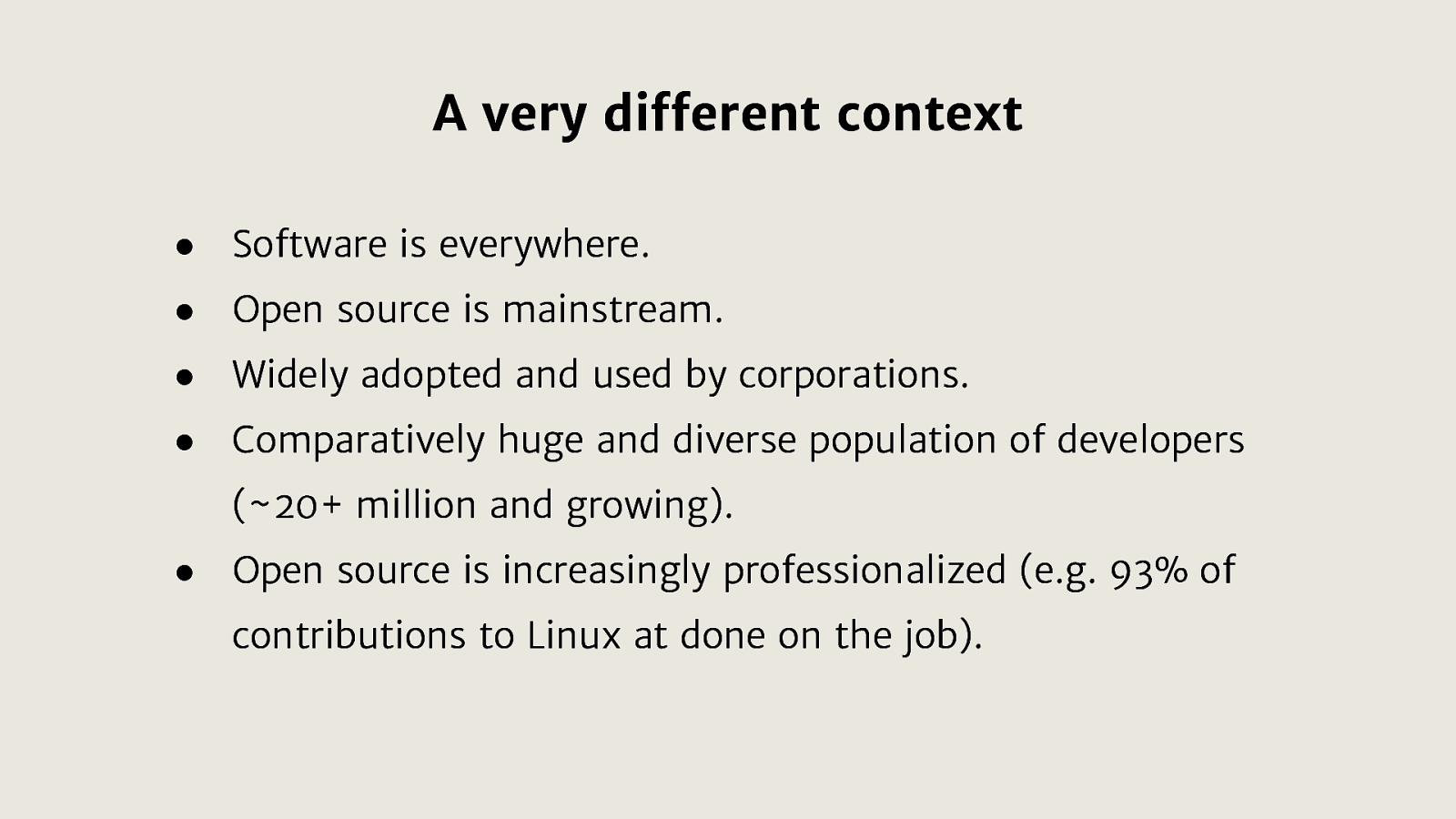
A very different context ● Software is everywhere. ● Open source is mainstream. ● Widely adopted and used by corporations. ● Comparatively huge and diverse population of developers (~20+ million and growing). ● Open source is increasingly professionalized (e.g. 93% of contributions to Linux at done on the job).
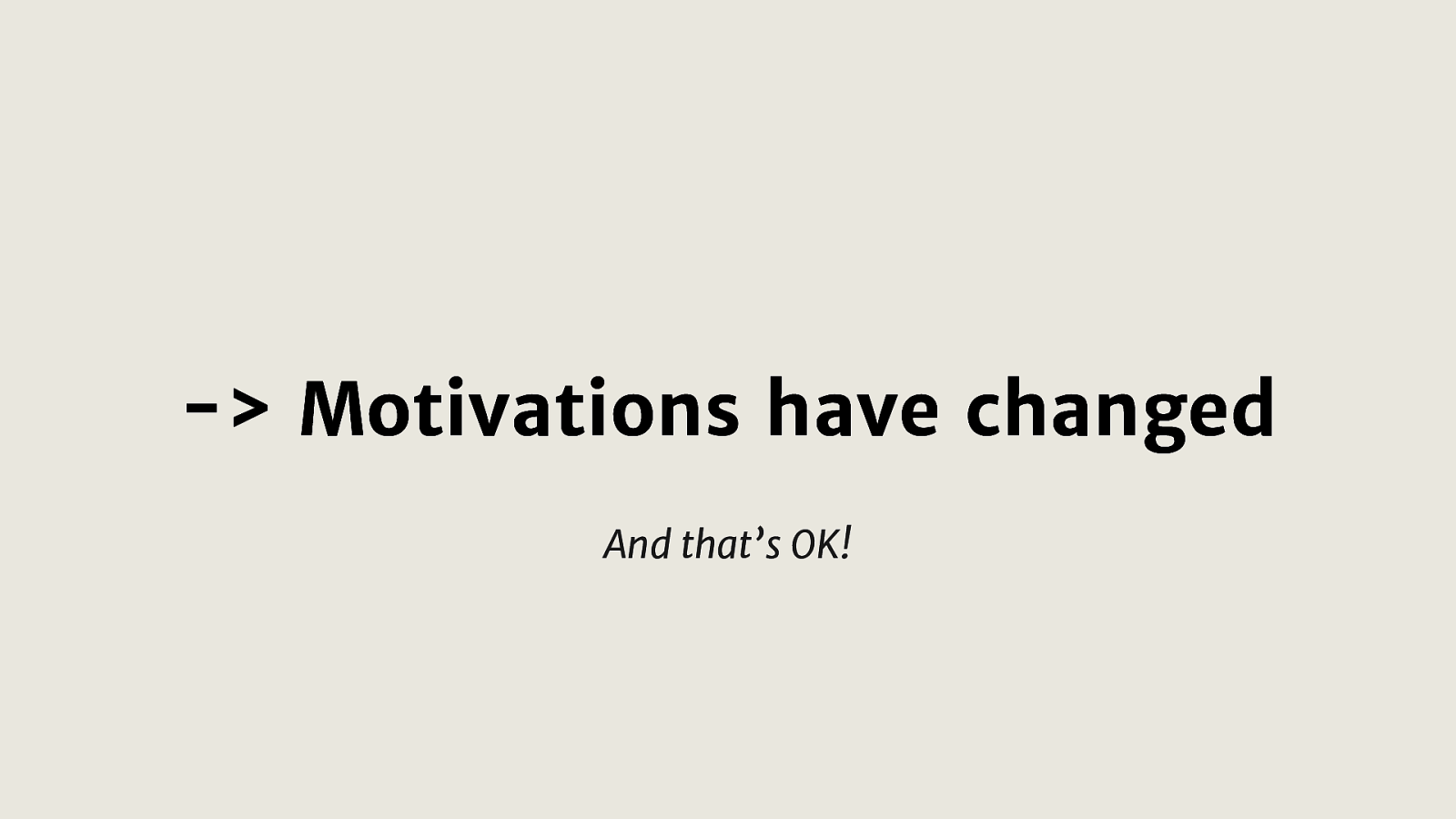
-> Motivations have changed And that’s OK!
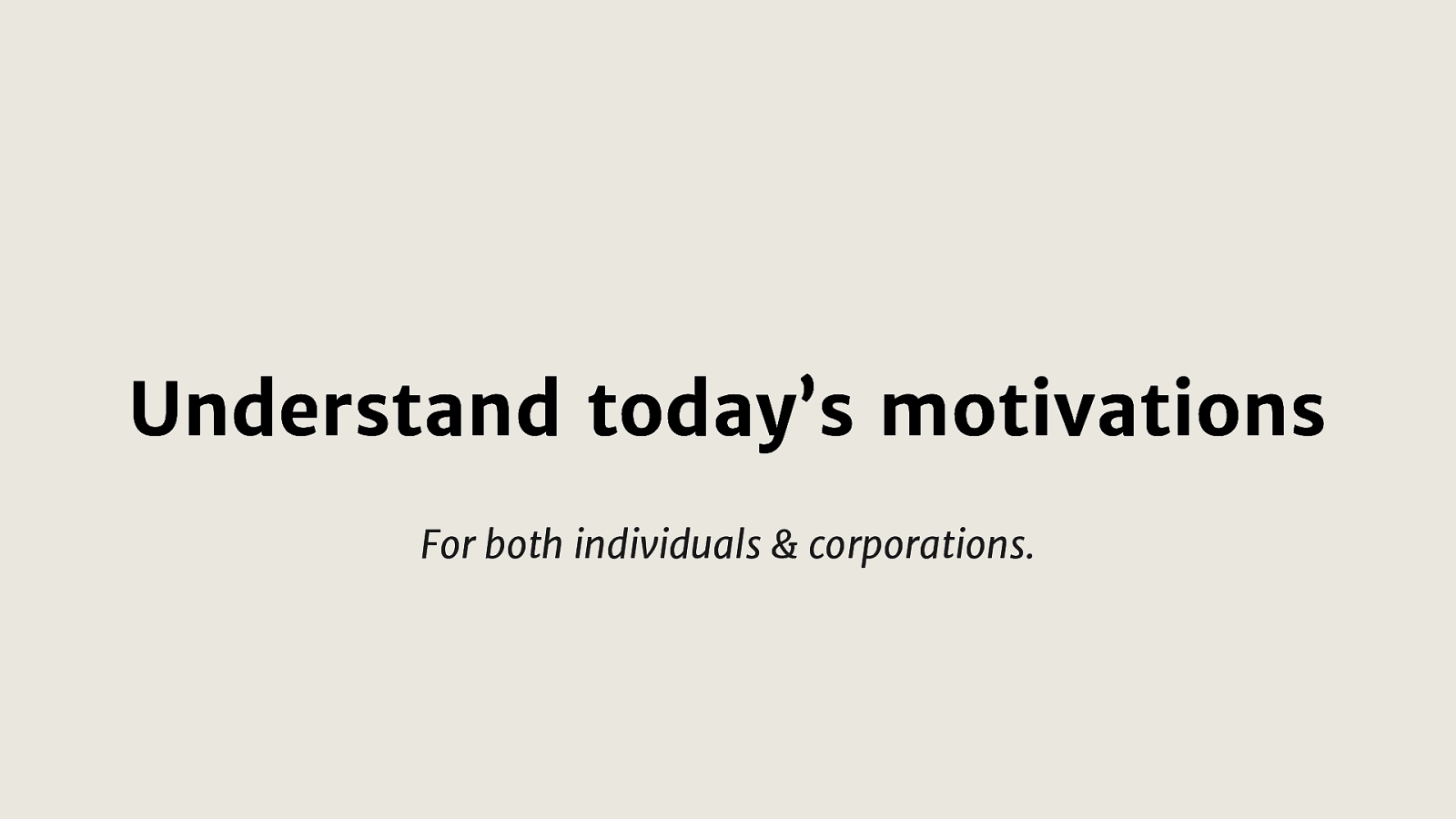
Understand today’s motivations For both individuals & corporations.
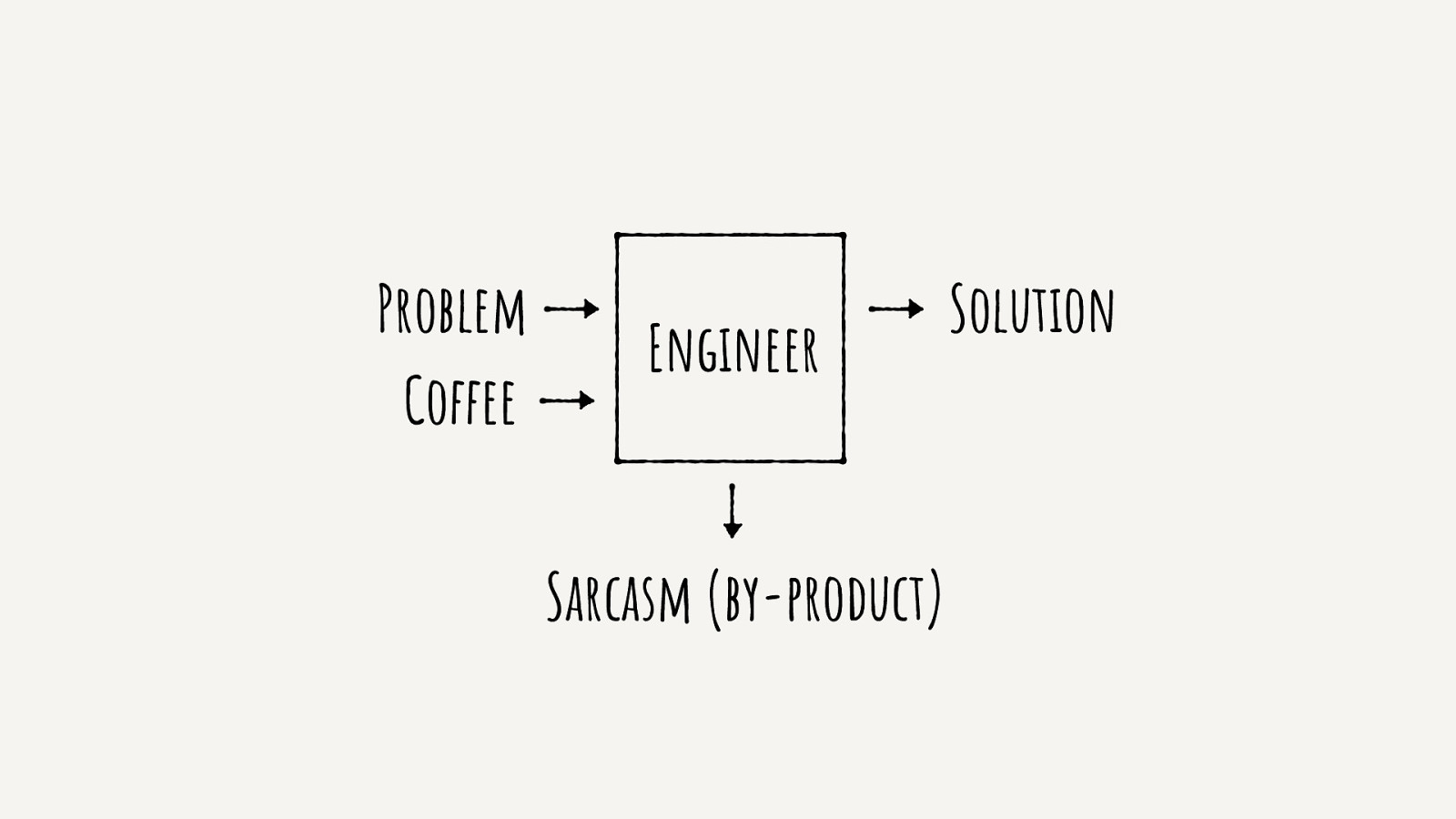
Problem Coffee Engineer Sarcasm (by-product) Solution
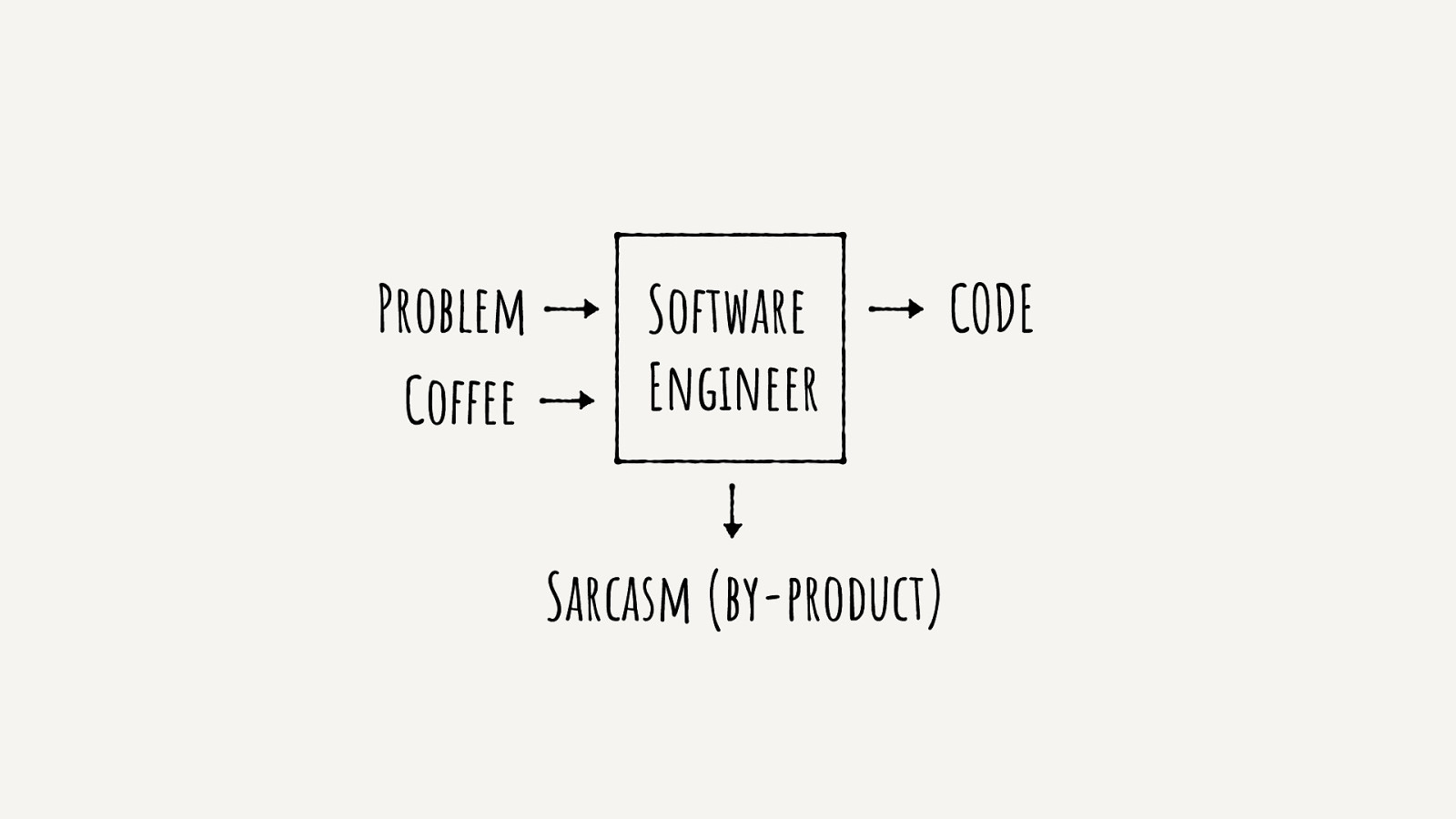
Problem Coffee Software Engineer Sarcasm (by-product) CODE

Problem Coffee Software Engineer Sarcasm (by-product) CODE
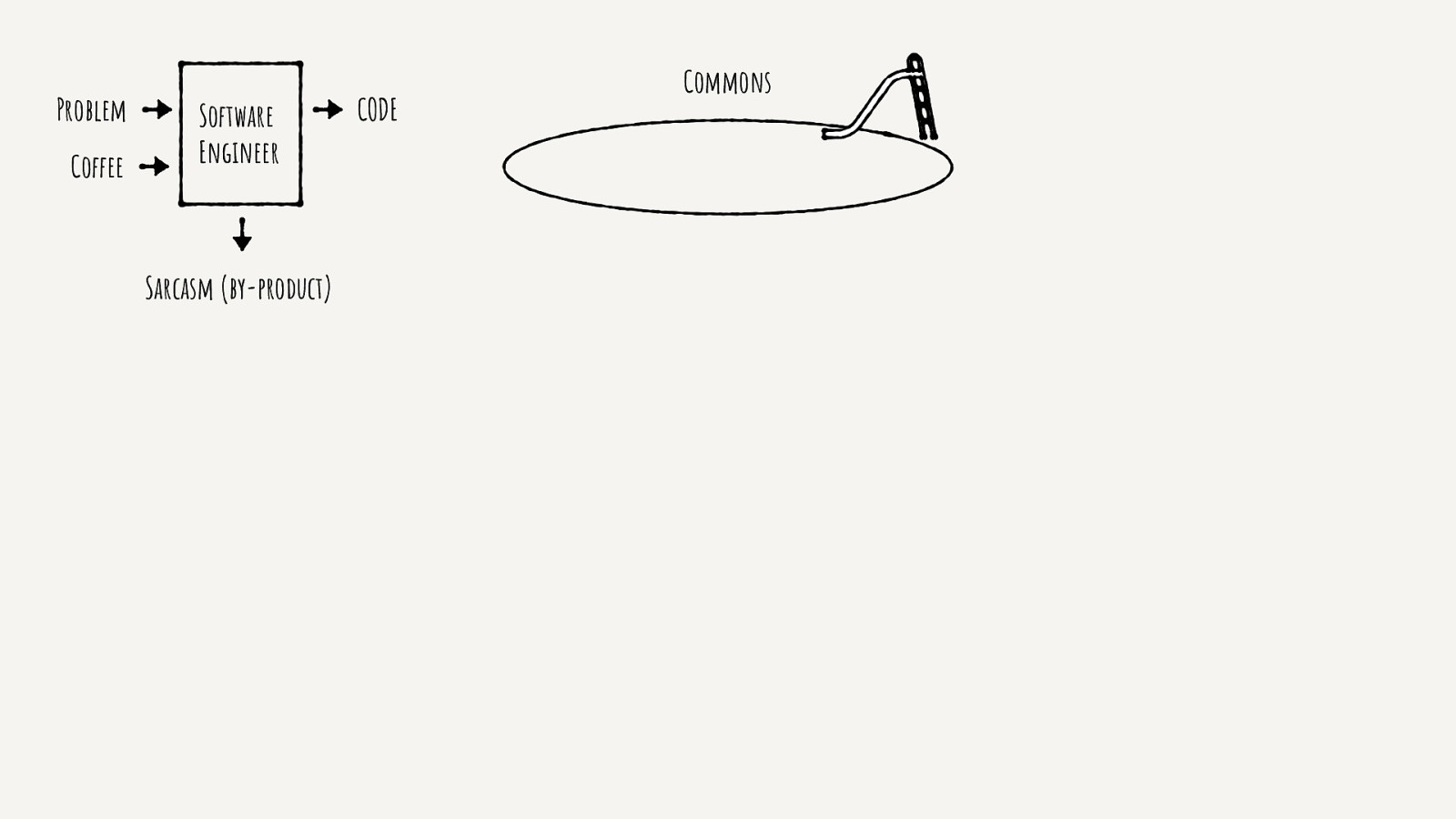
Problem Coffee Software Engineer Sarcasm (by-product) CODE Commons
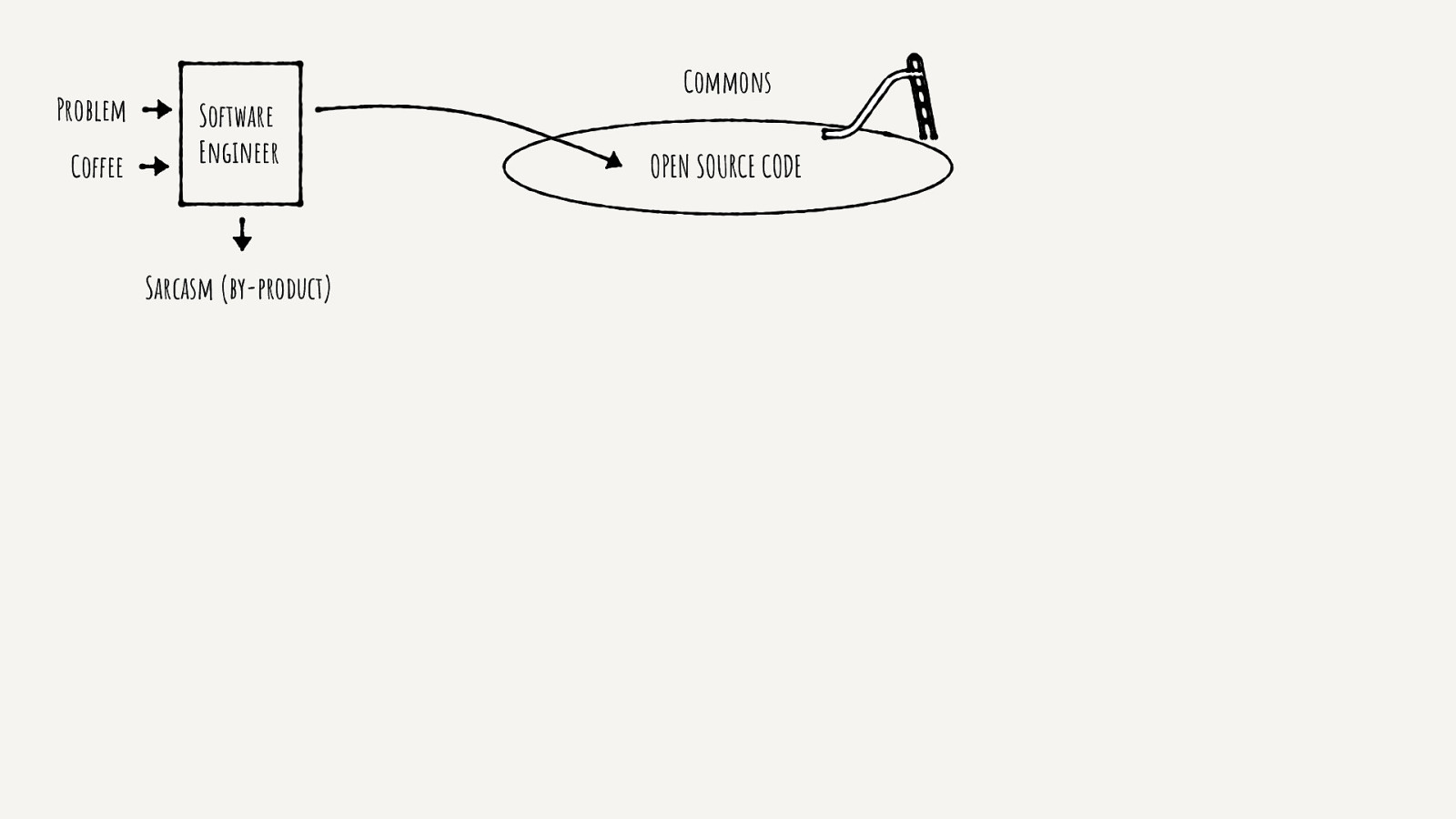
Problem Coffee Software Engineer Sarcasm (by-product) Commons OPEN SOURCE CODE
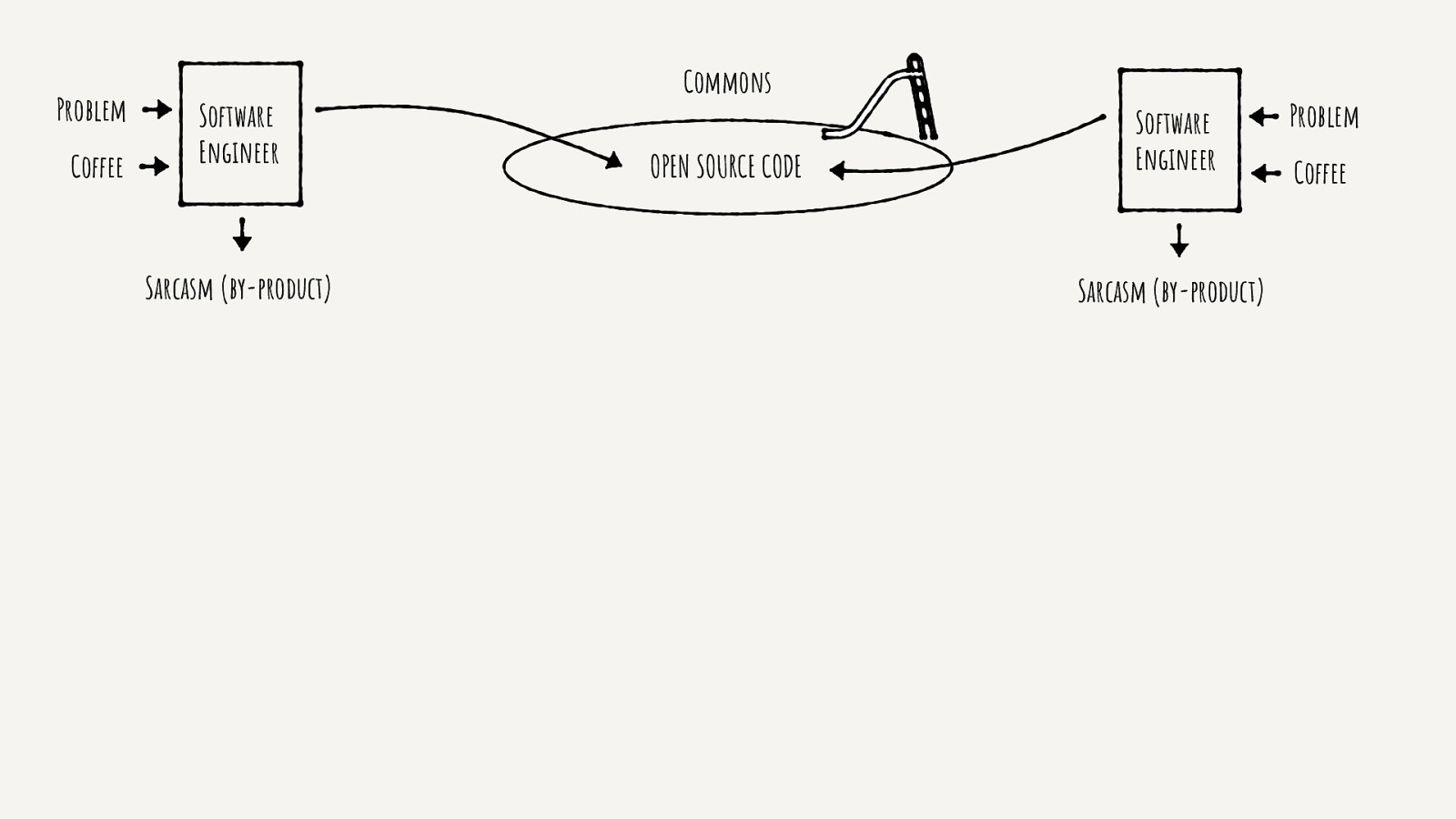
Problem Coffee Software Engineer Sarcasm (by-product) Commons OPEN SOURCE CODE Software Engineer Sarcasm (by-product) Problem Coffee
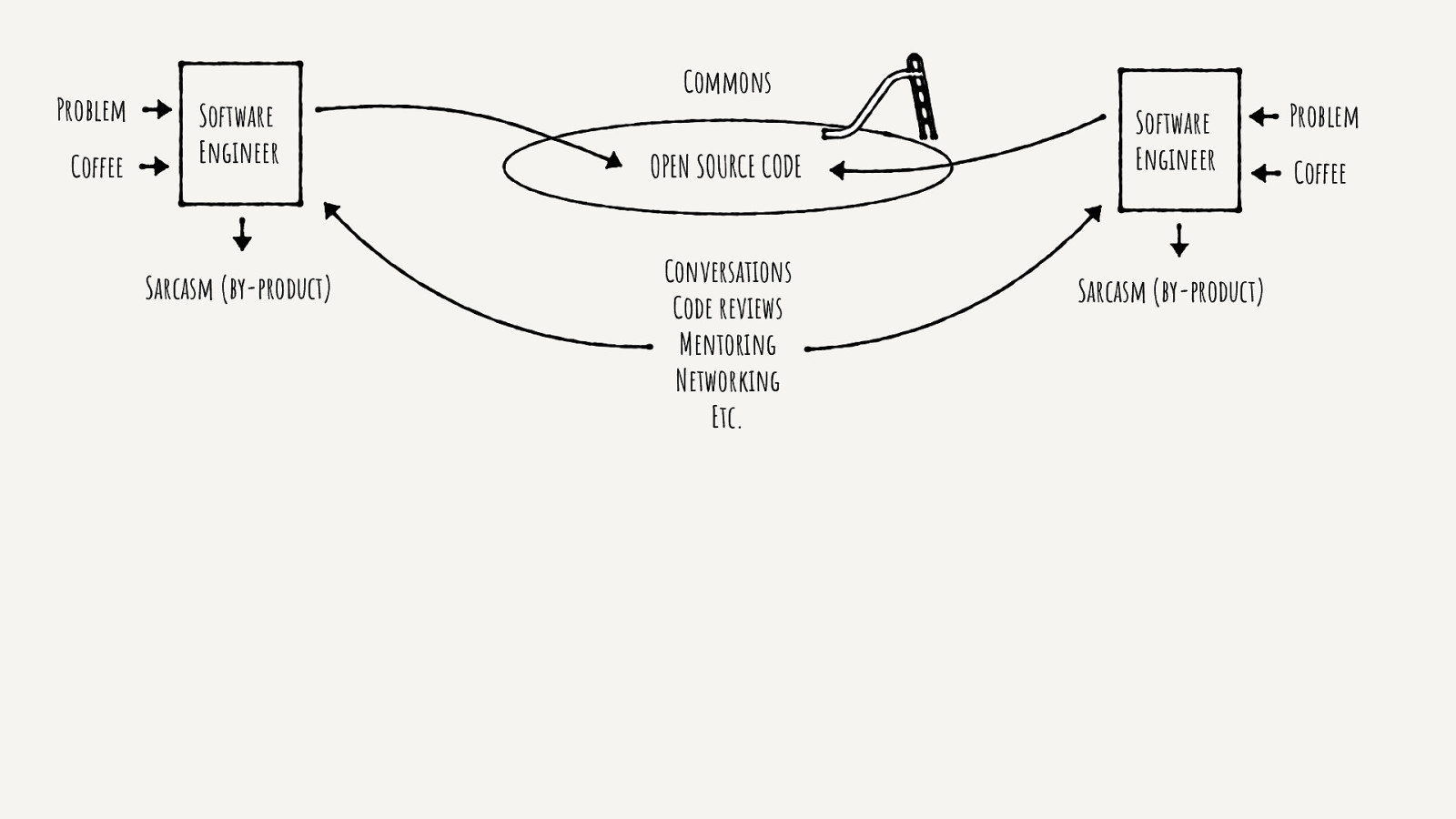
Problem Coffee Software Engineer Sarcasm (by-product) Commons OPEN SOURCE CODE Conversations Code reviews Mentoring Networking Etc. Software Engineer Sarcasm (by-product) Problem Coffee
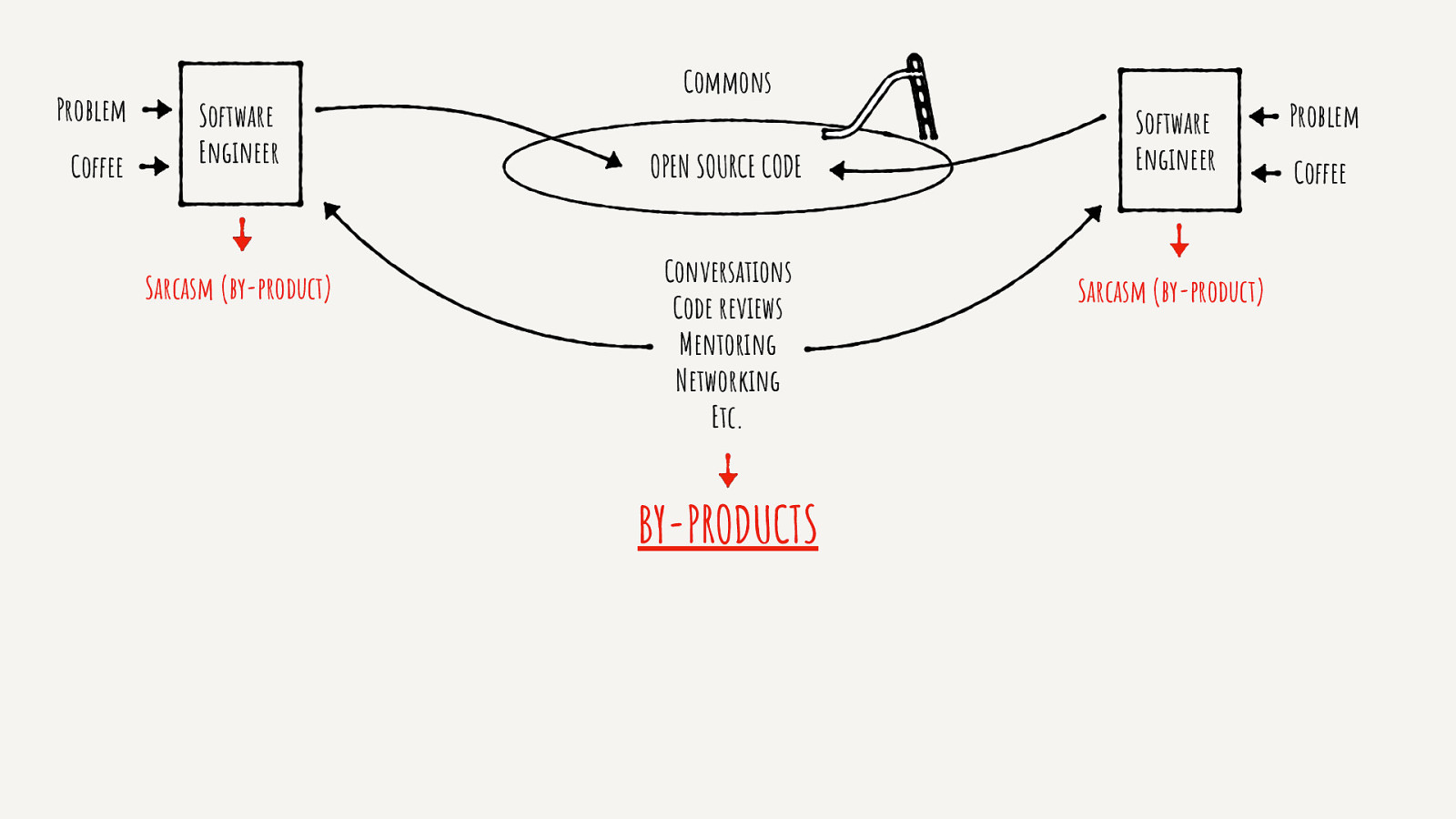
Problem Coffee Software Engineer Sarcasm (by-product) Commons OPEN SOURCE CODE Conversations Code reviews Mentoring Networking Etc. BY-PRODUCTS Software Engineer Sarcasm (by-product) Problem Coffee
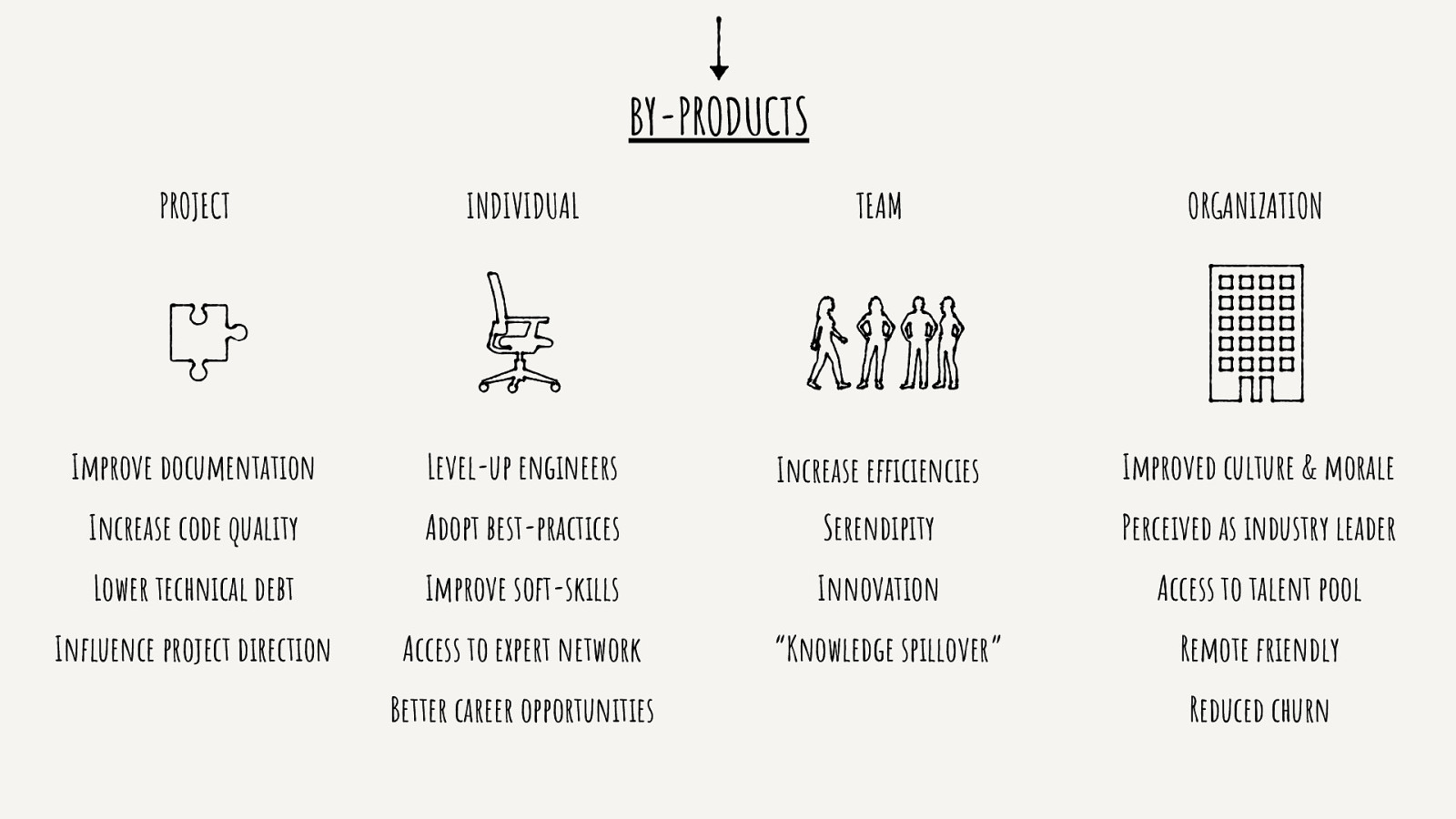
BY-PRODUCTS PROJECT INDIVIDUAL TEAM ORGANIZATION Improve documentation Level-up engineers Increase efficiencies Improved culture & morale Increase code quality Adopt best-practices Serendipity Perceived as industry leader Lower technical debt Improve soft-skills Innovation Access to talent pool Influence project direction Access to expert network “Knowledge spillover” Remote friendly Better career opportunities Reduced churn
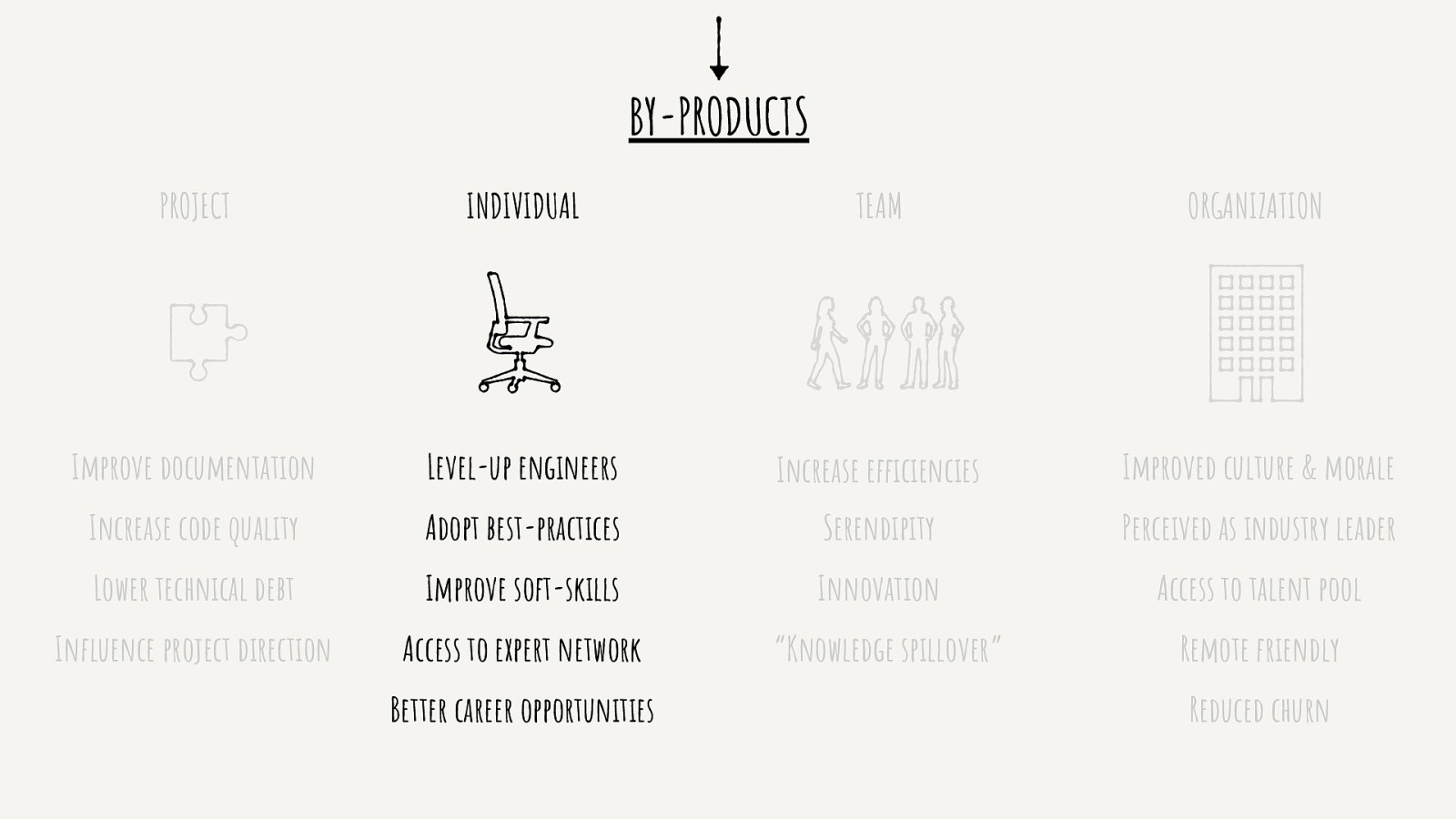
BY-PRODUCTS PROJECT INDIVIDUAL TEAM ORGANIZATION Improve documentation Level-up engineers Increase efficiencies Improved culture & morale Increase code quality Adopt best-practices Serendipity Perceived as industry leader Lower technical debt Improve soft-skills Innovation Access to talent pool Influence project direction Access to expert network “Knowledge spillover” Remote friendly Better career opportunities Reduced churn
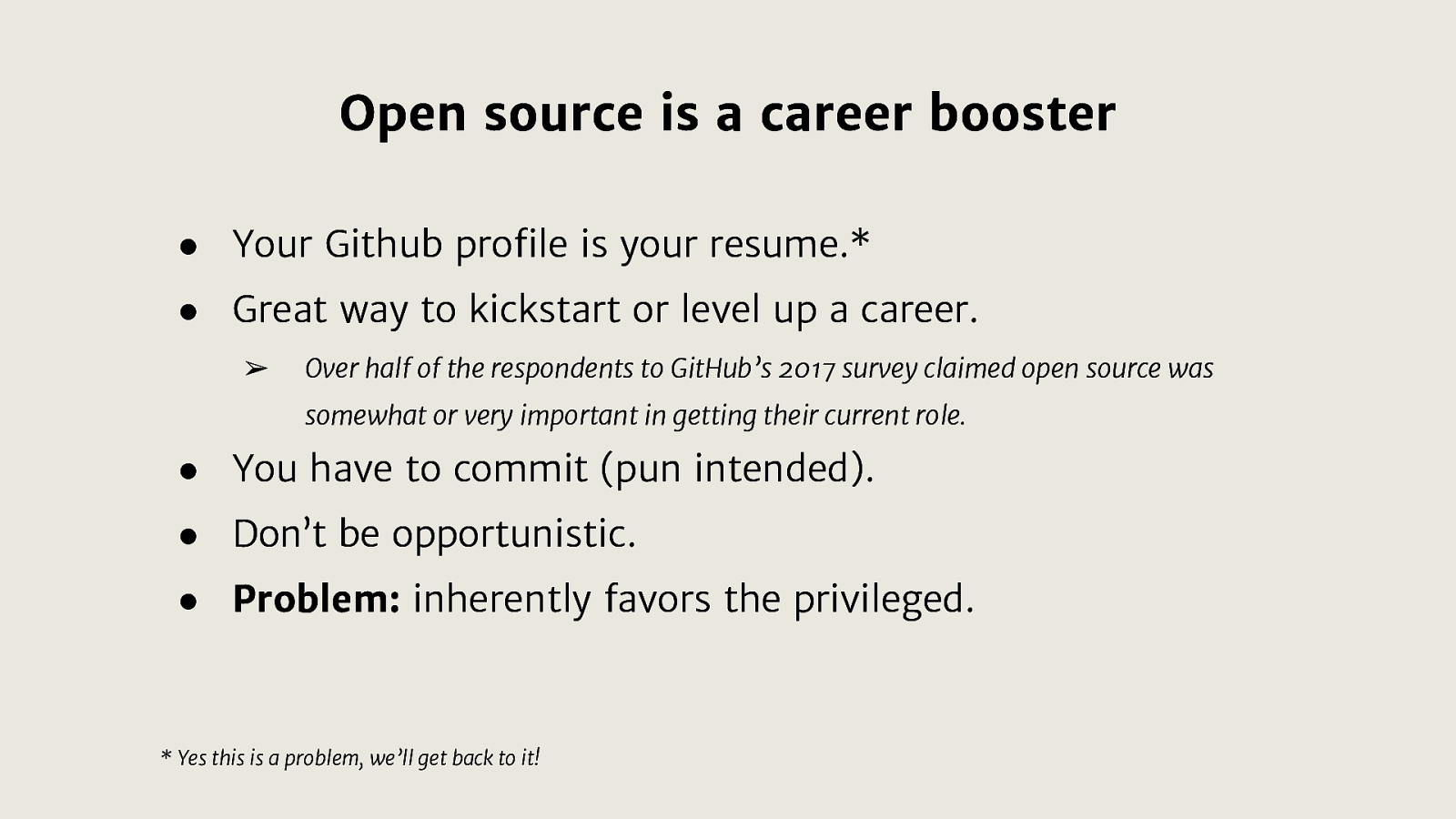
Open source is a career booster ● Your Github profile is your resume.* ● Great way to kickstart or level up a career. ➢ Over half of the respondents to GitHub’s 2017 survey claimed open source was somewhat or very important in getting their current role. ● You have to commit (pun intended). ● Don’t be opportunistic. ● Problem: inherently favors the privileged.
- Yes this is a problem, we’ll get back to it!
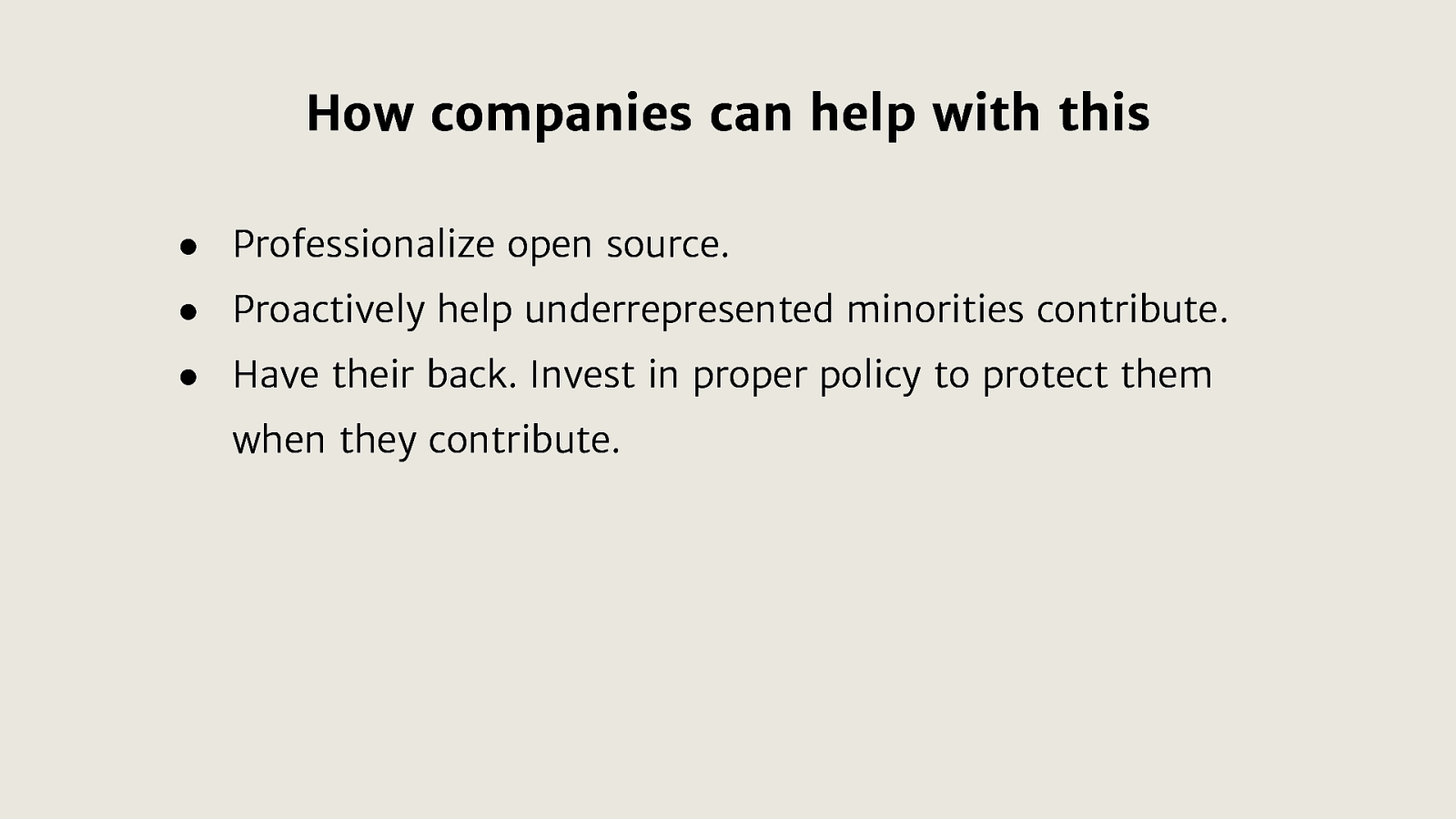
How companies can help with this ● Professionalize open source. ● Proactively help underrepresented minorities contribute. ● Have their back. Invest in proper policy to protect them when they contribute.
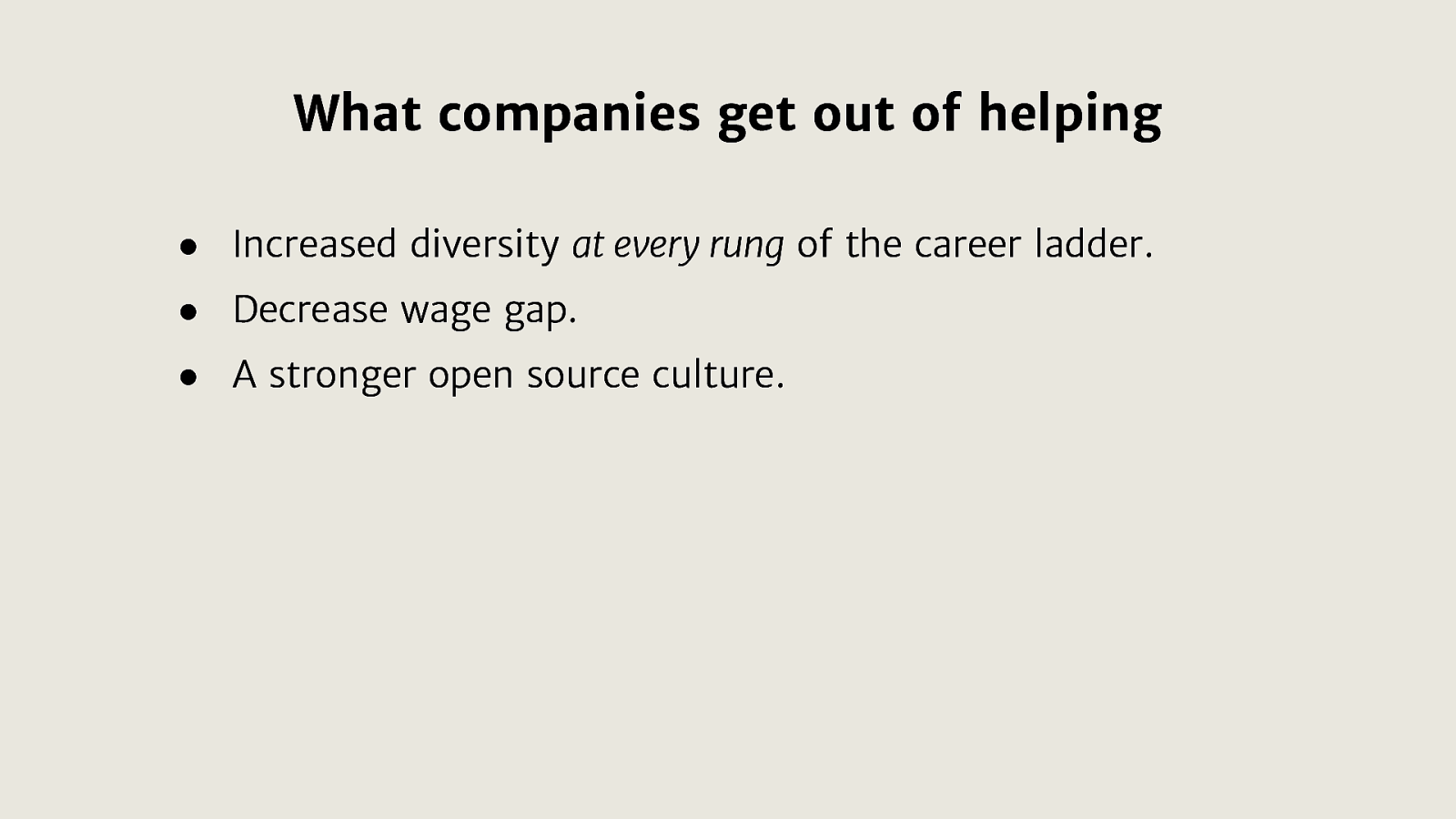
What companies get out of helping ● Increased diversity at every rung of the career ladder. ● Decrease wage gap. ● A stronger open source culture.
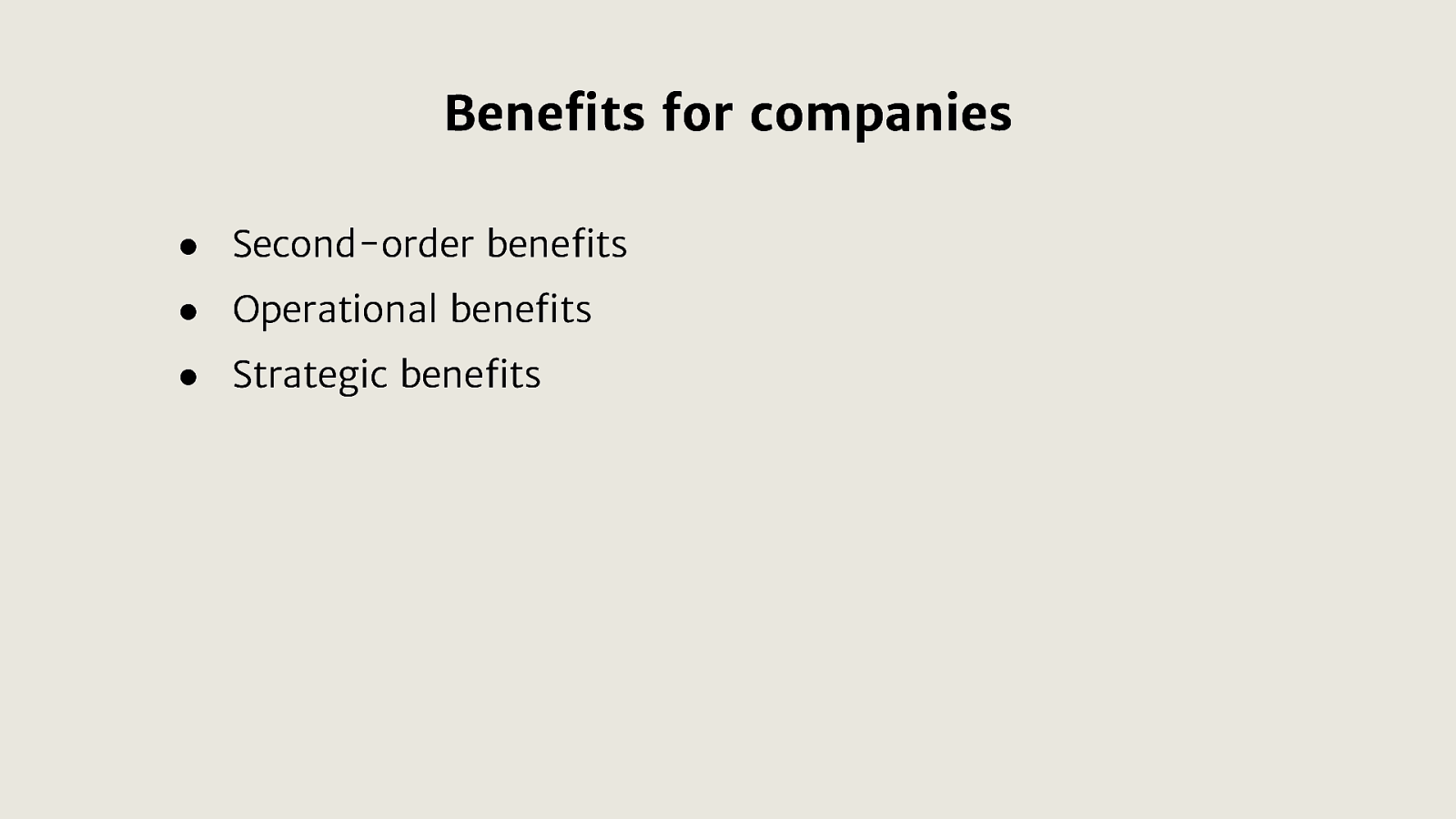
Benefits for companies ● Second-order benefits ● Operational benefits ● Strategic benefits
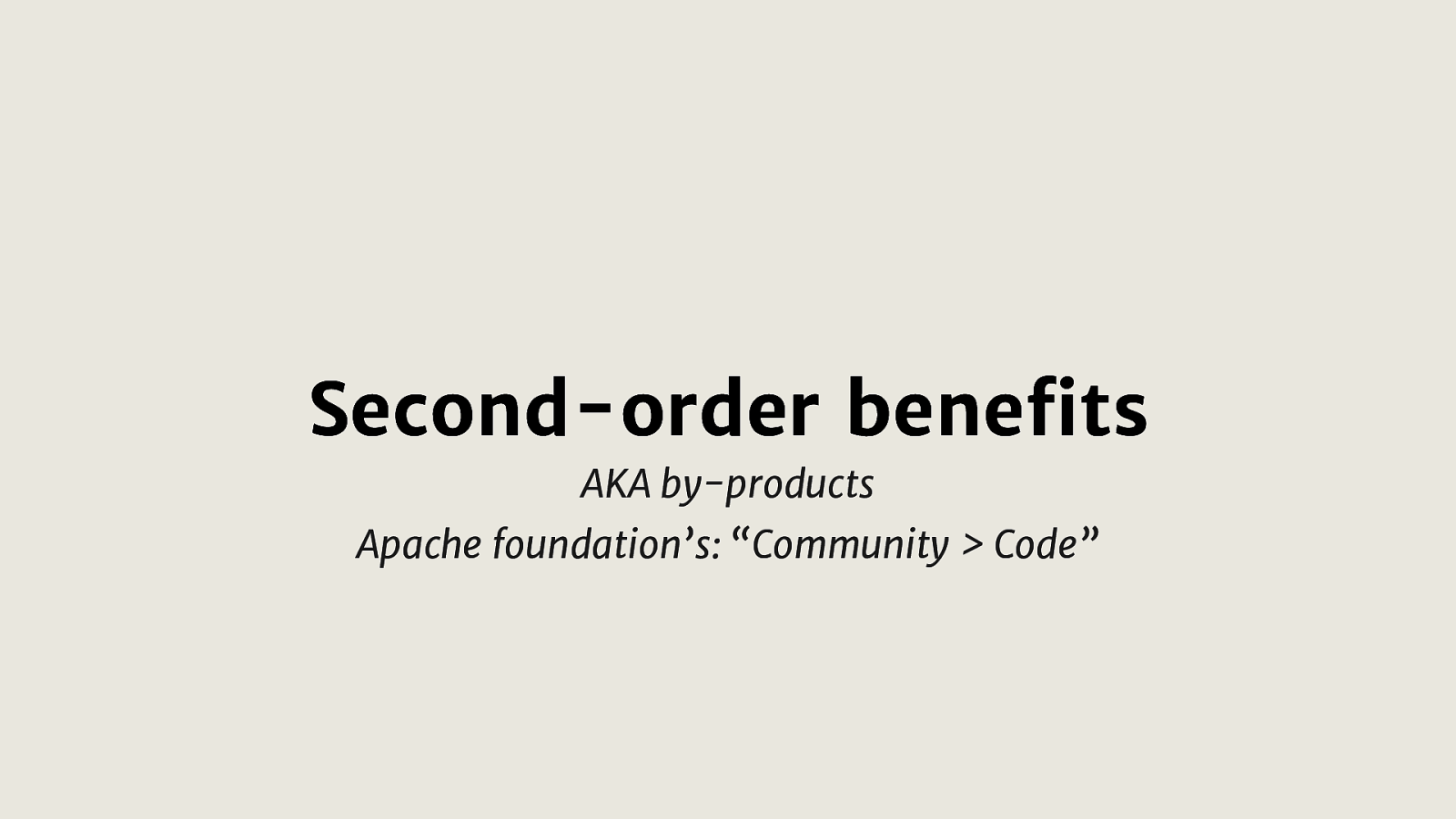
Second-order benefits AKA by-products Apache foundation’s: “Community > Code”
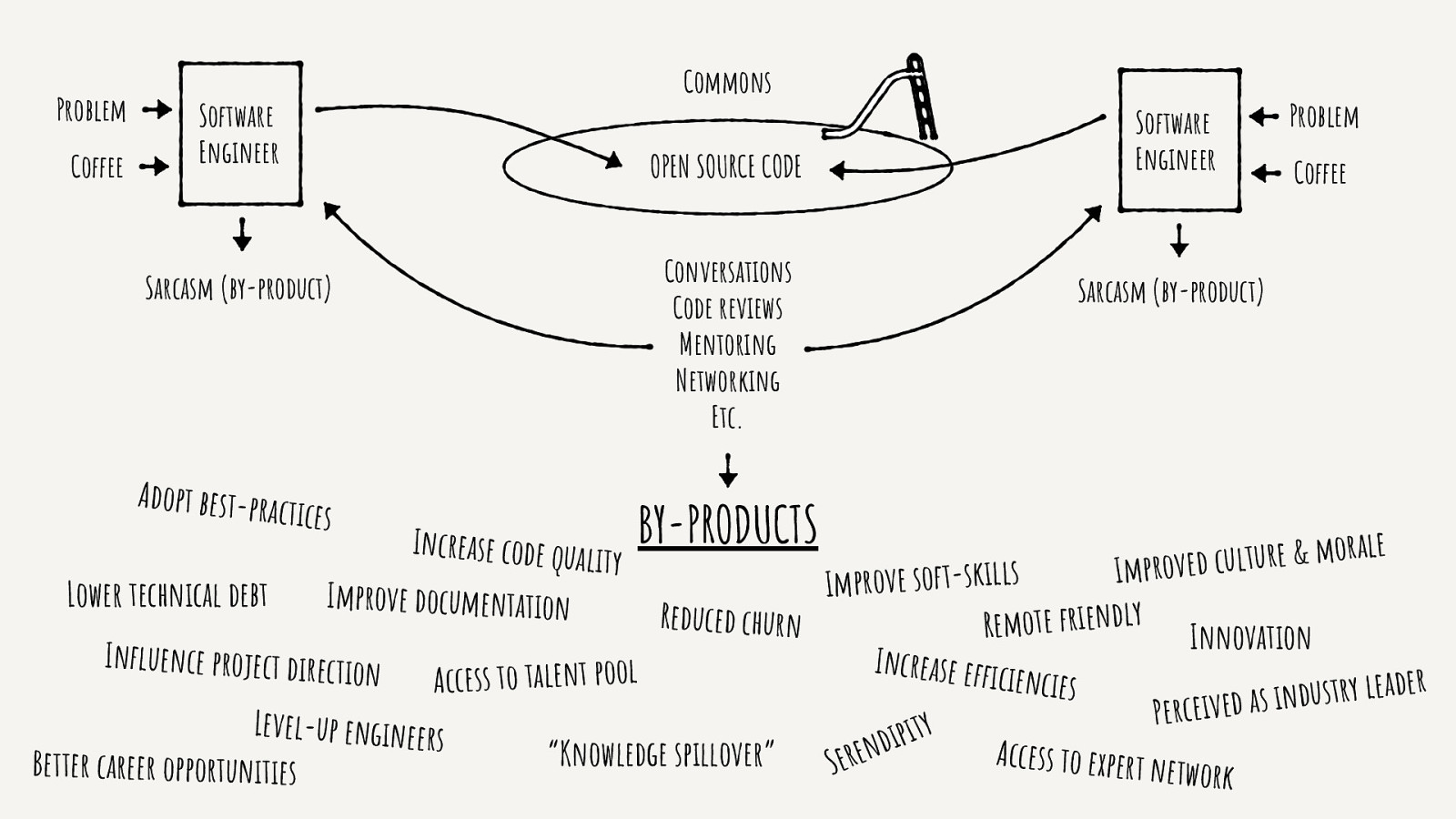
Problem Coffee Commons Software Engineer OPEN SOURCE CODE Conversations Code reviews Mentoring Networking Etc. Sarcasm (by-product) Adopt best-prac tices Increase code qua BY-PRODUCTS Software Engineer Problem Coffee Sarcasm (by-product) & morale e r u lt cu d e v o pr Im Improve soft-skills Lower technical debt Improve documentation Reduced churn Remote friendly Innovation Influence project directio Increase effi n ciencies Access to talent pool ry leader t s u d in s a d e iv Perce Level-up engineers y t i p i d Access to expert n “Knowledge spillover” Seren Better career opportunities etwork lity
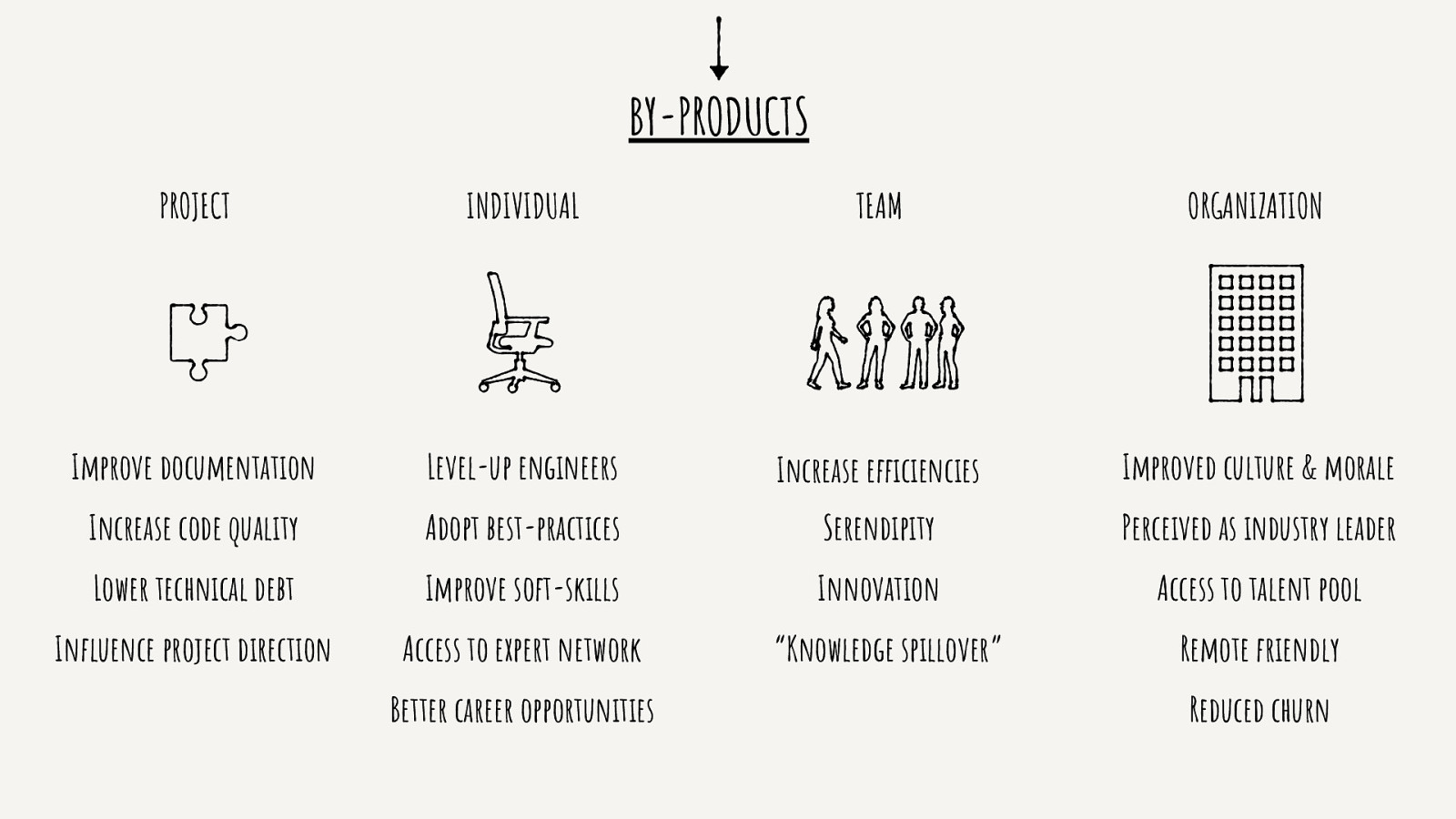
BY-PRODUCTS PROJECT INDIVIDUAL TEAM ORGANIZATION Improve documentation Level-up engineers Increase efficiencies Improved culture & morale Increase code quality Adopt best-practices Serendipity Perceived as industry leader Lower technical debt Improve soft-skills Innovation Access to talent pool Influence project direction Access to expert network “Knowledge spillover” Remote friendly Better career opportunities Reduced churn
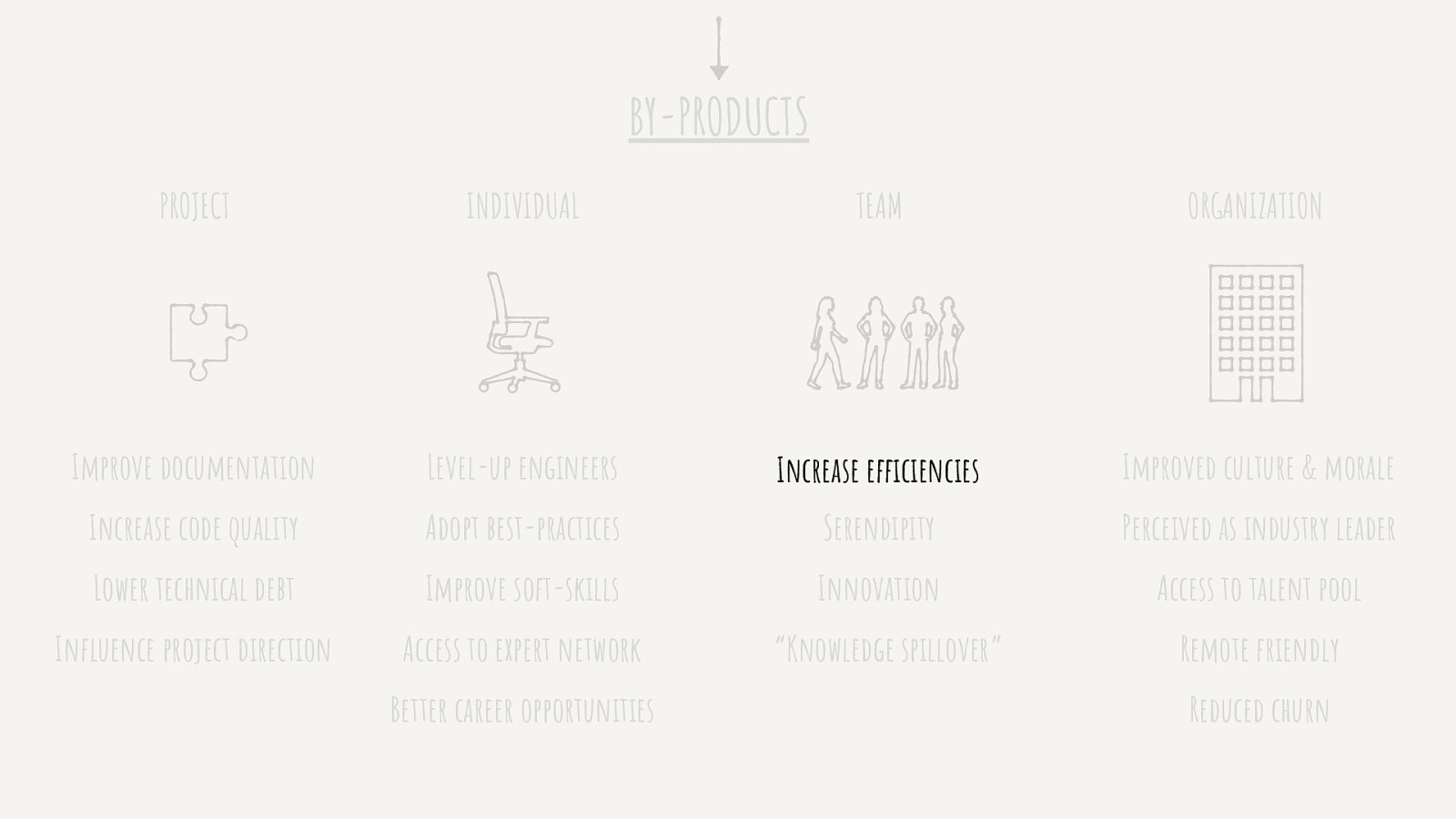
BY-PRODUCTS PROJECT INDIVIDUAL TEAM ORGANIZATION Improve documentation Level-up engineers Increase efficiencies Improved culture & morale Increase code quality Adopt best-practices Serendipity Perceived as industry leader Lower technical debt Improve soft-skills Innovation Access to talent pool Influence project direction Access to expert network “Knowledge spillover” Remote friendly Better career opportunities Reduced churn
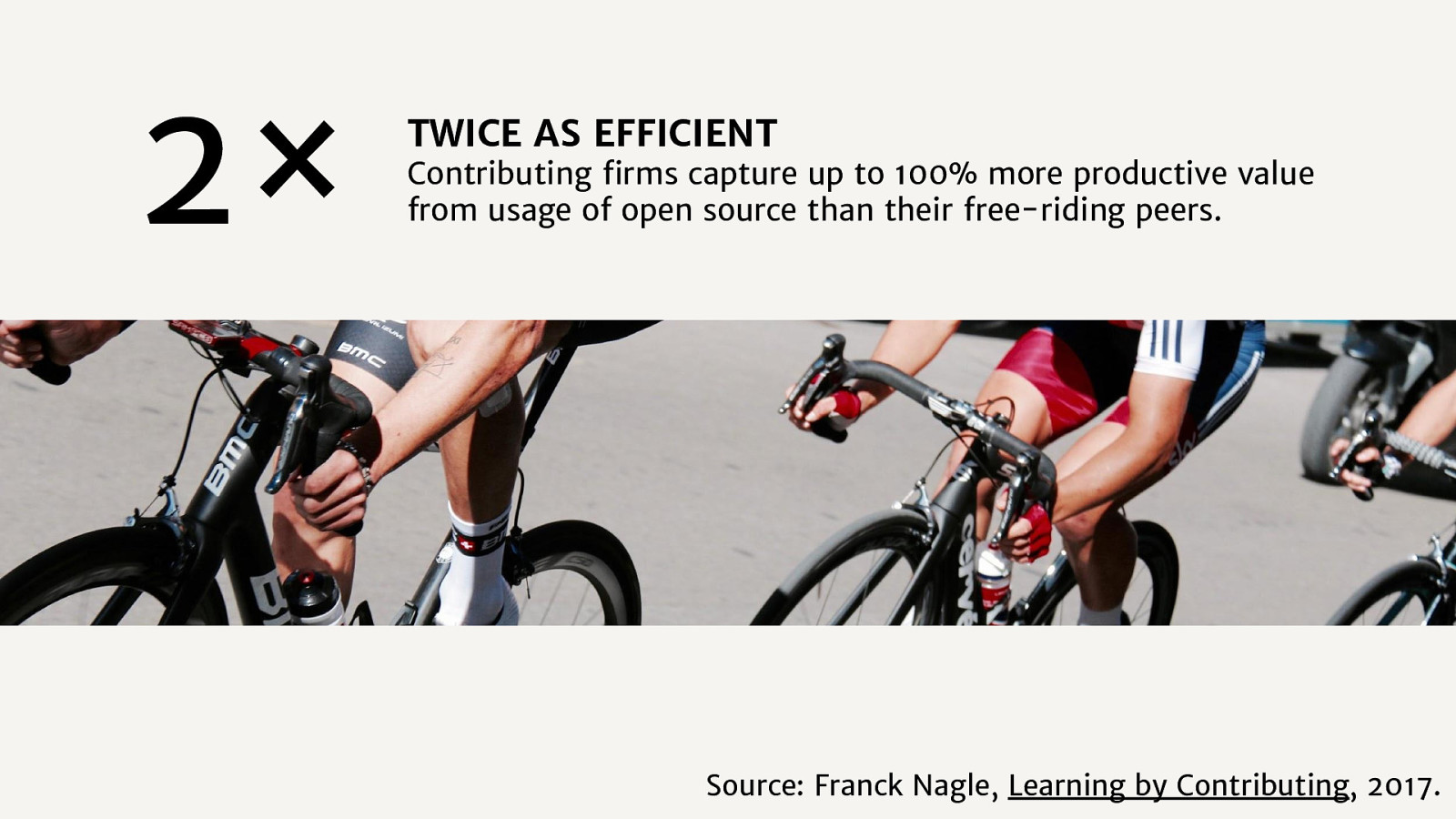
2× TWICE AS EFFICIENT Contributing firms capture up to 100% more productive value from usage of open source than their free-riding peers. Source: Franck Nagle, Learning by Contributing, 2017.
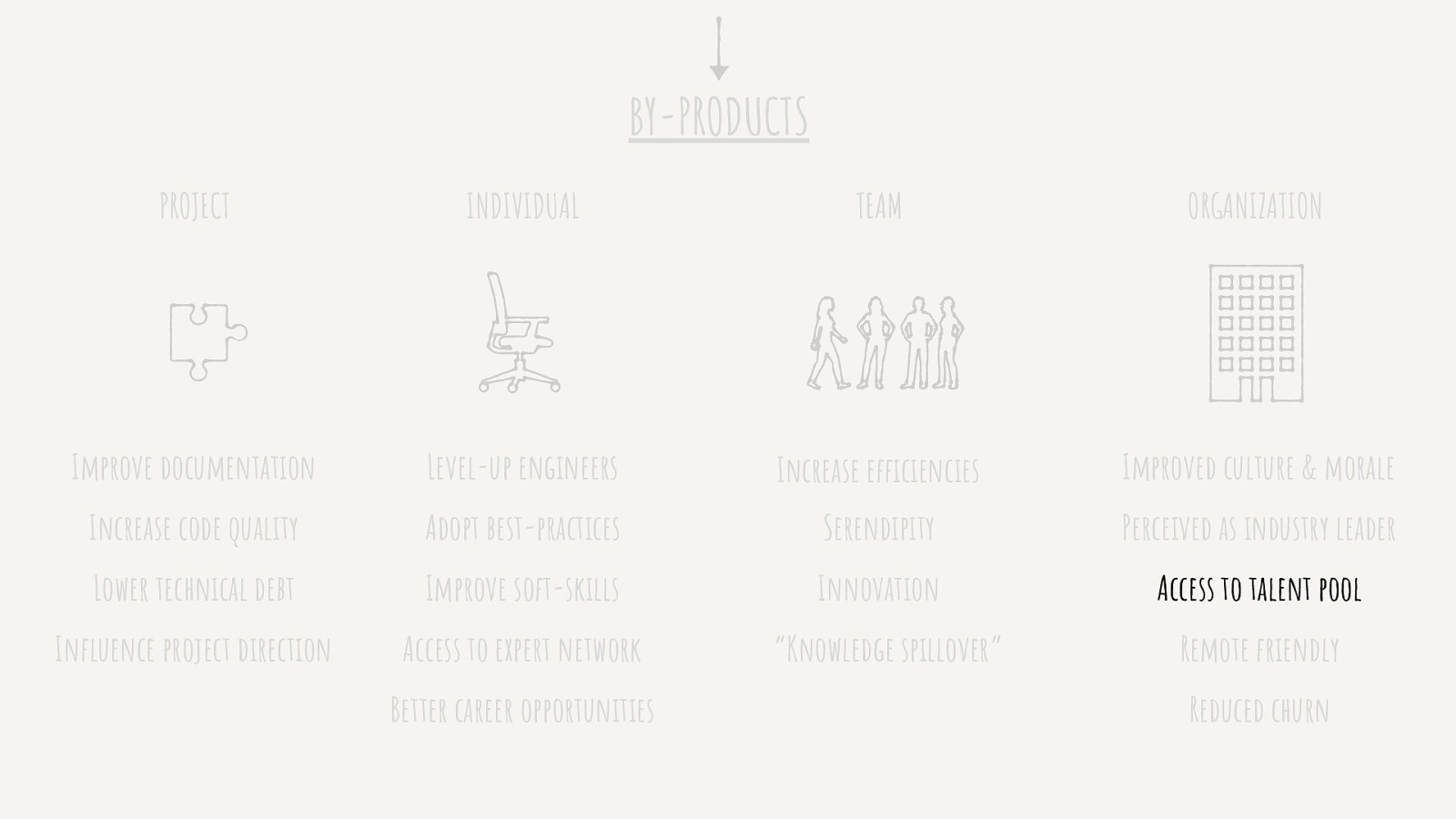
BY-PRODUCTS PROJECT INDIVIDUAL TEAM ORGANIZATION Improve documentation Level-up engineers Increase efficiencies Improved culture & morale Increase code quality Adopt best-practices Serendipity Perceived as industry leader Lower technical debt Improve soft-skills Innovation Access to talent pool Influence project direction Access to expert network “Knowledge spillover” Remote friendly Better career opportunities Reduced churn
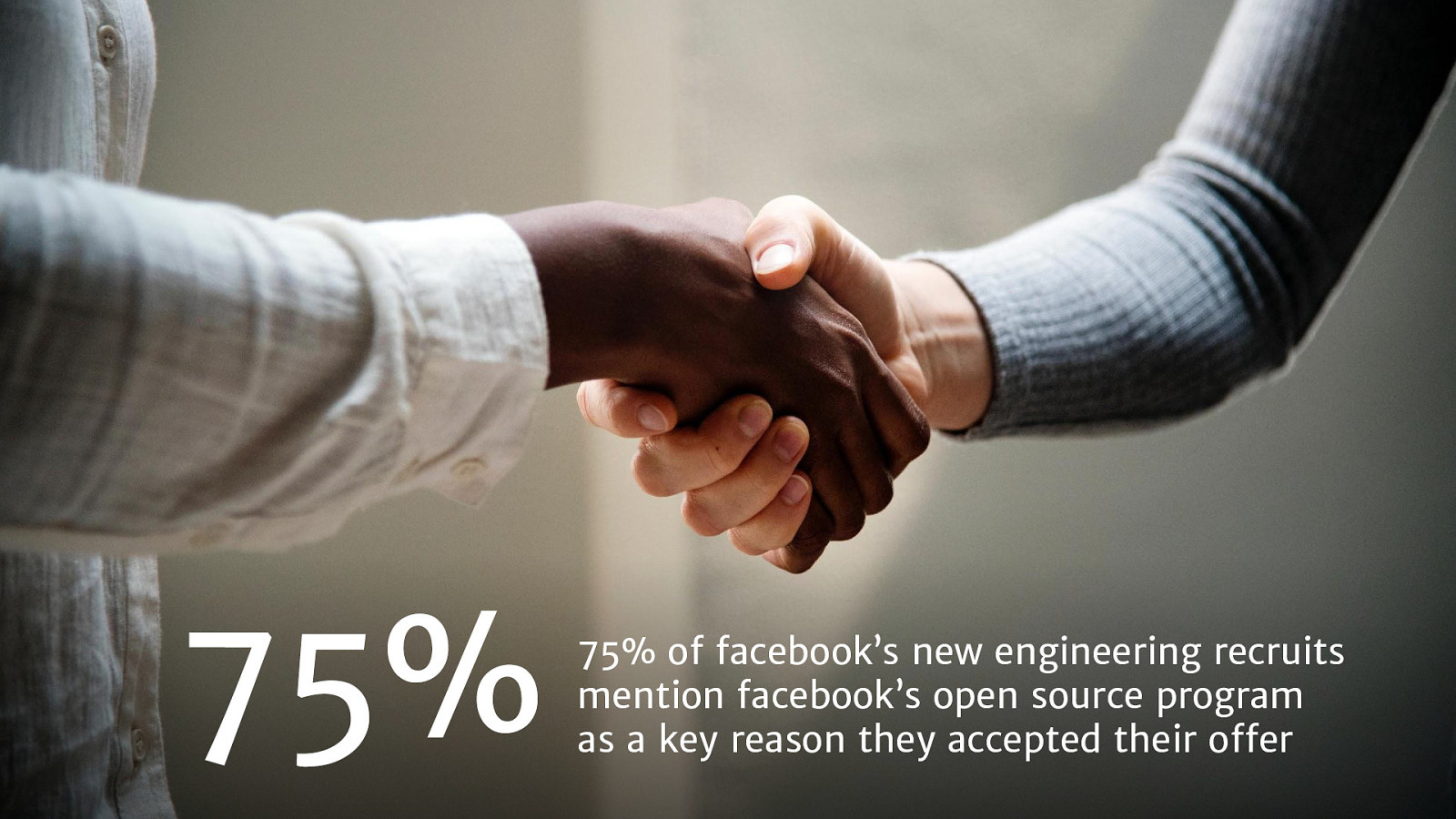
75% 75% of facebook’s new engineering recruits mention facebook’s open source program as a key reason they accepted their offer
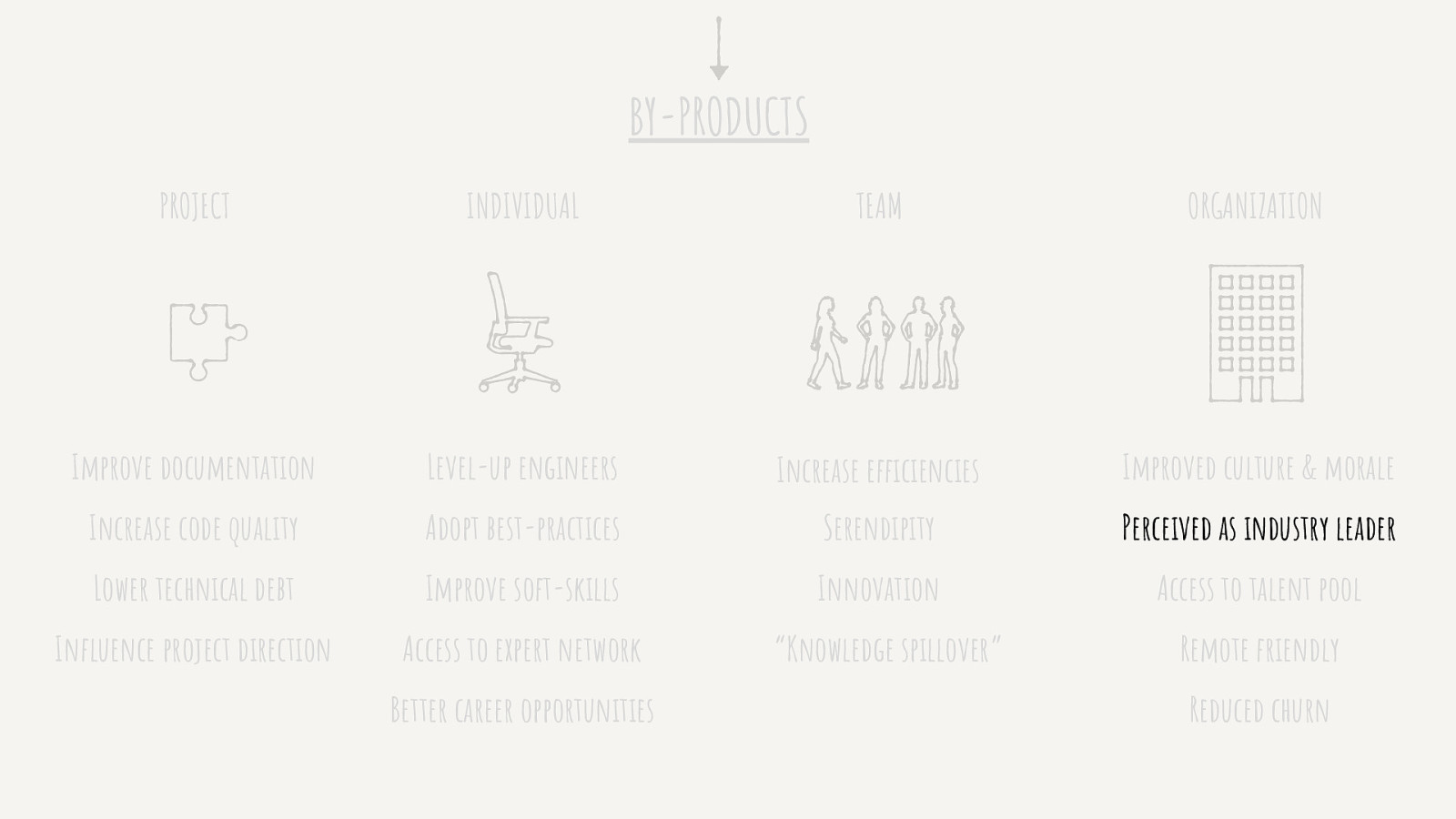
BY-PRODUCTS PROJECT INDIVIDUAL TEAM ORGANIZATION Improve documentation Level-up engineers Increase efficiencies Improved culture & morale Increase code quality Adopt best-practices Serendipity Perceived as industry leader Lower technical debt Improve soft-skills Innovation Access to talent pool Influence project direction Access to expert network “Knowledge spillover” Remote friendly Better career opportunities Reduced churn
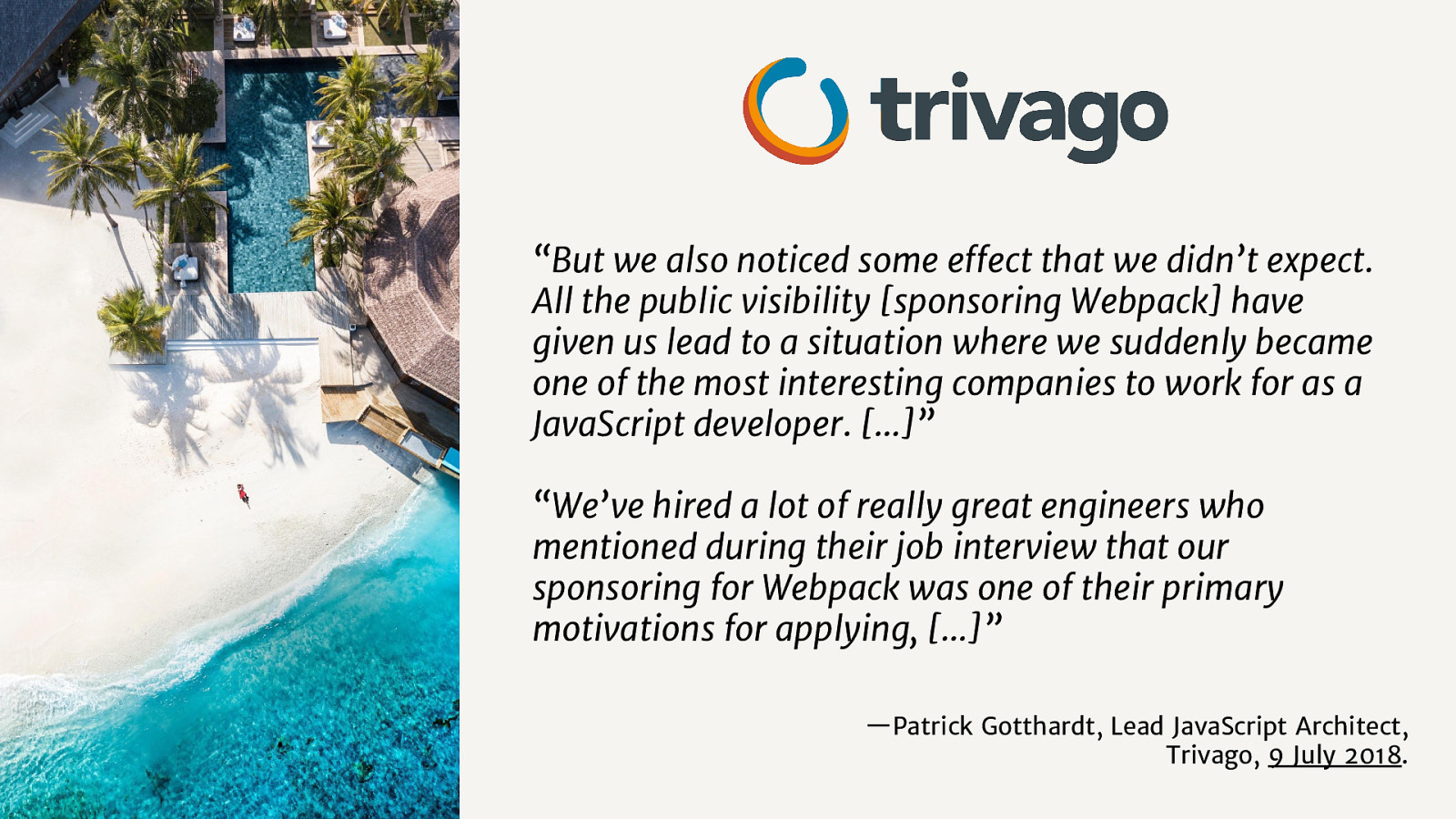
“But we also noticed some effect that we didn’t expect. All the public visibility [sponsoring Webpack] have given us lead to a situation where we suddenly became one of the most interesting companies to work for as a JavaScript developer. […]” “We’ve hired a lot of really great engineers who mentioned during their job interview that our sponsoring for Webpack was one of their primary motivations for applying, […]” —Patrick Gotthardt, Lead JavaScript Architect, Trivago, 9 July 2018.
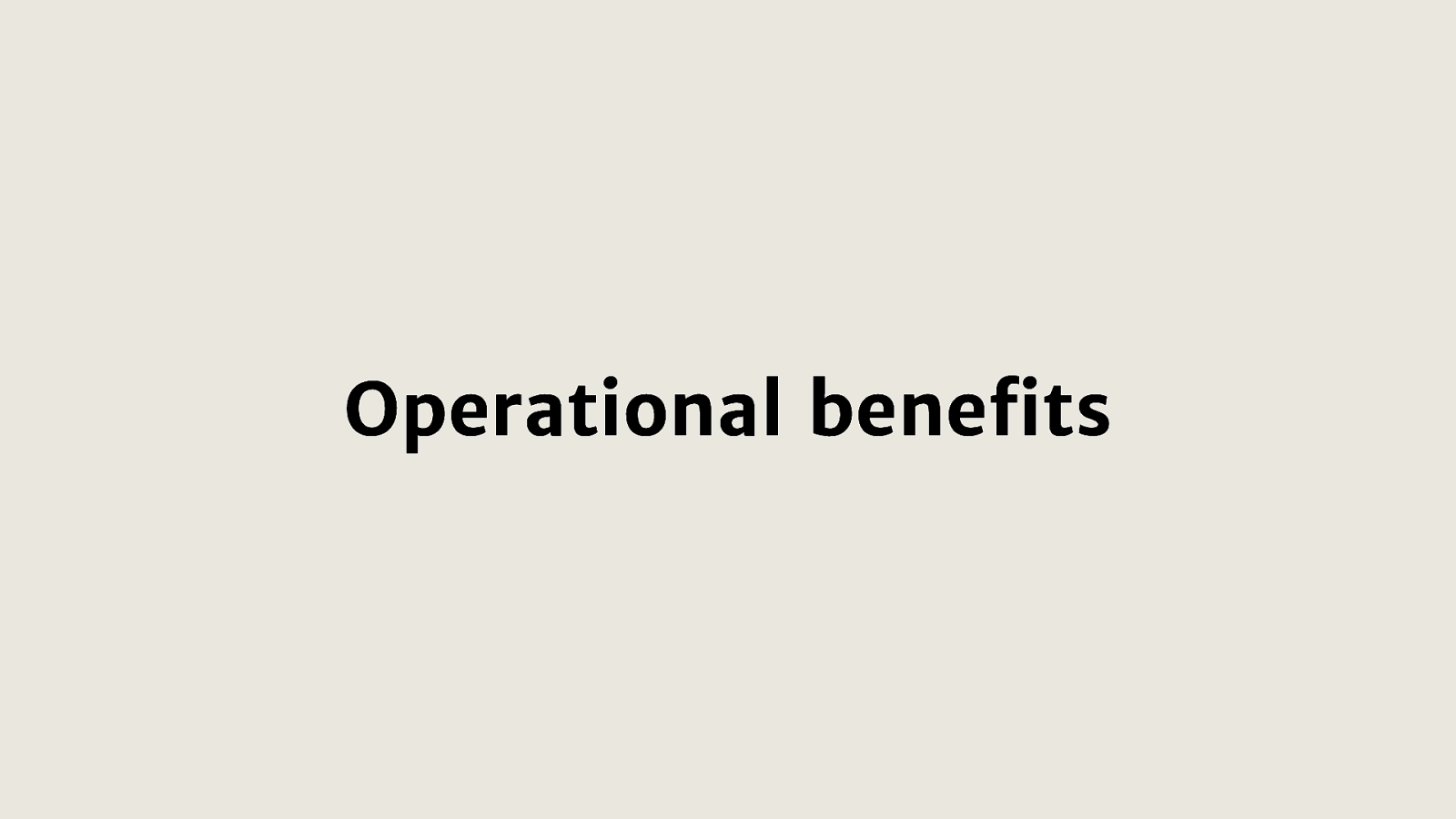
Operational benefits

Photo: Pablo Andrés Rivero, 1997 (CC BY-NC-ND 2.0) Payback Technical Debt
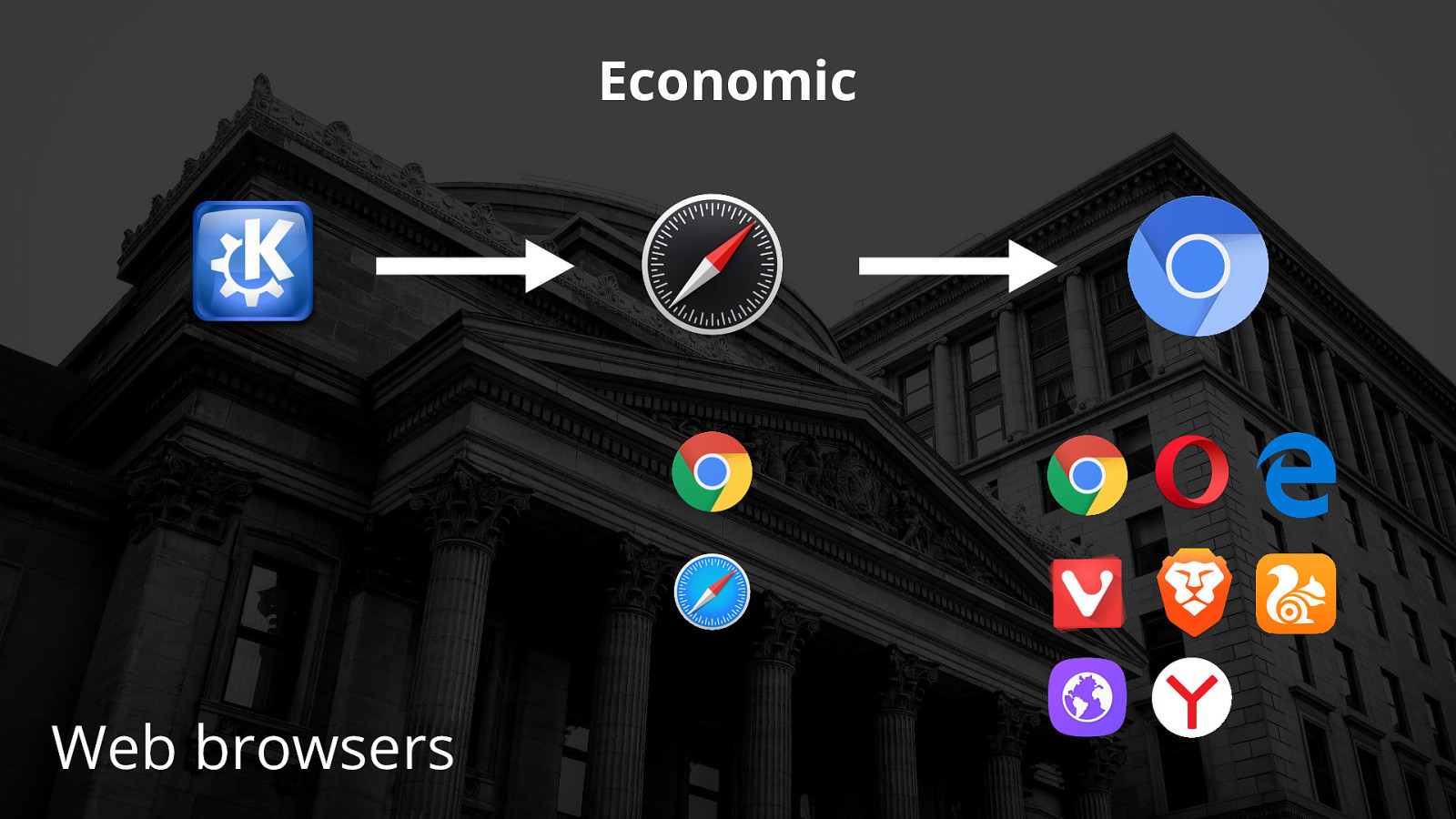
Economic Web browsers
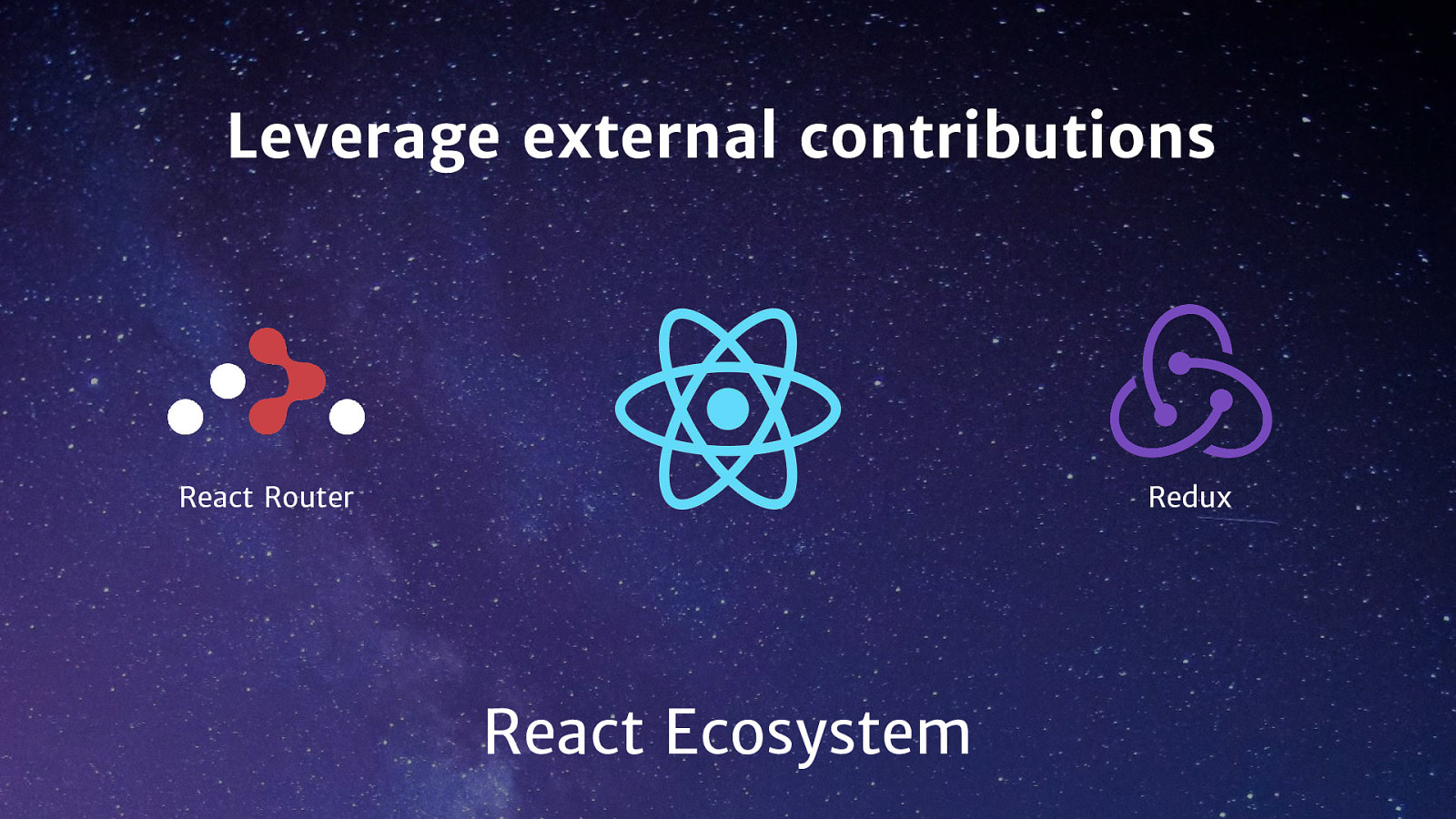
Leverage external contributions React Router Redux React Ecosystem

Strategic benefits

On-ramp developers
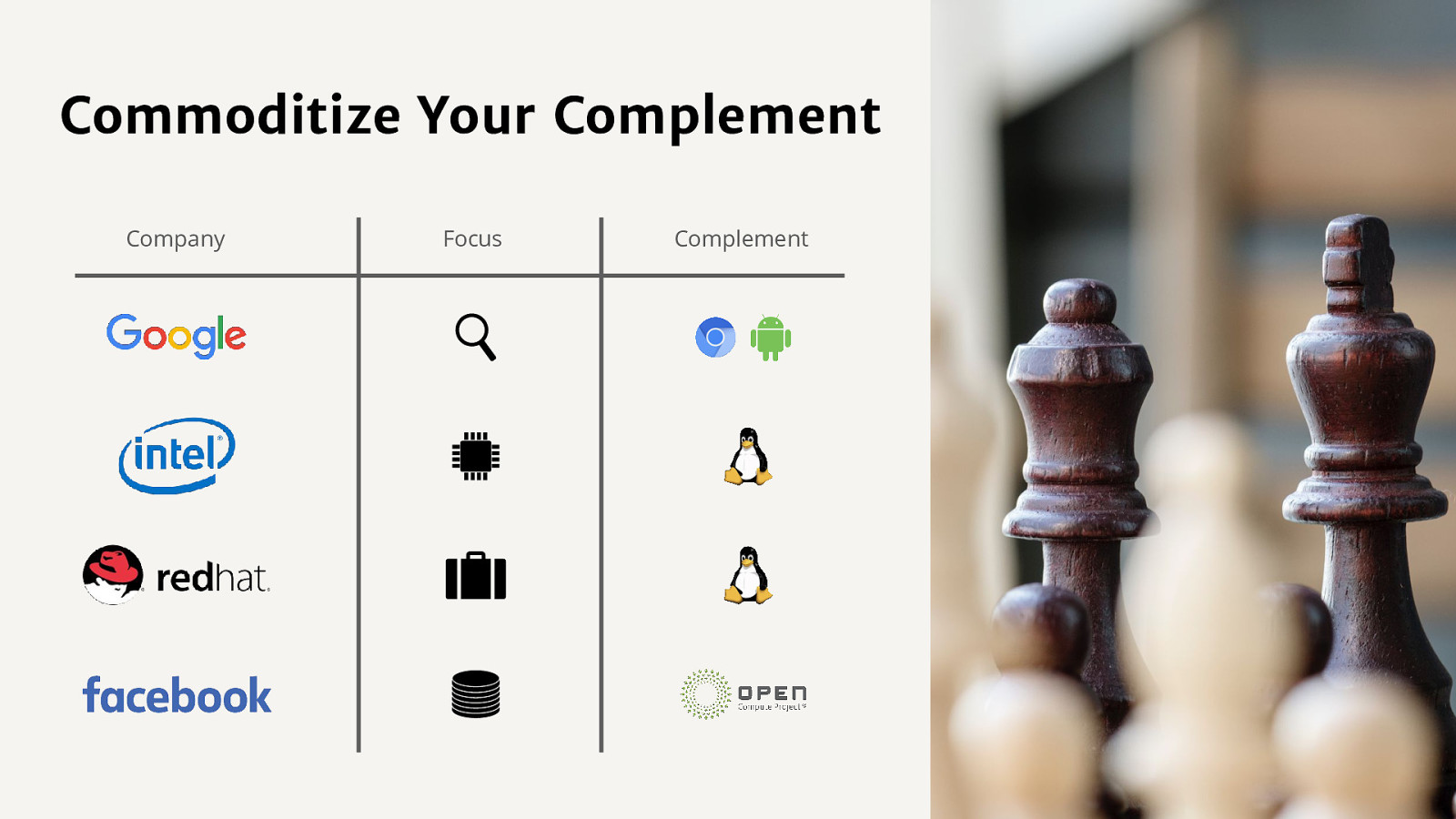
Commoditize Your Complement Company Focus Complement
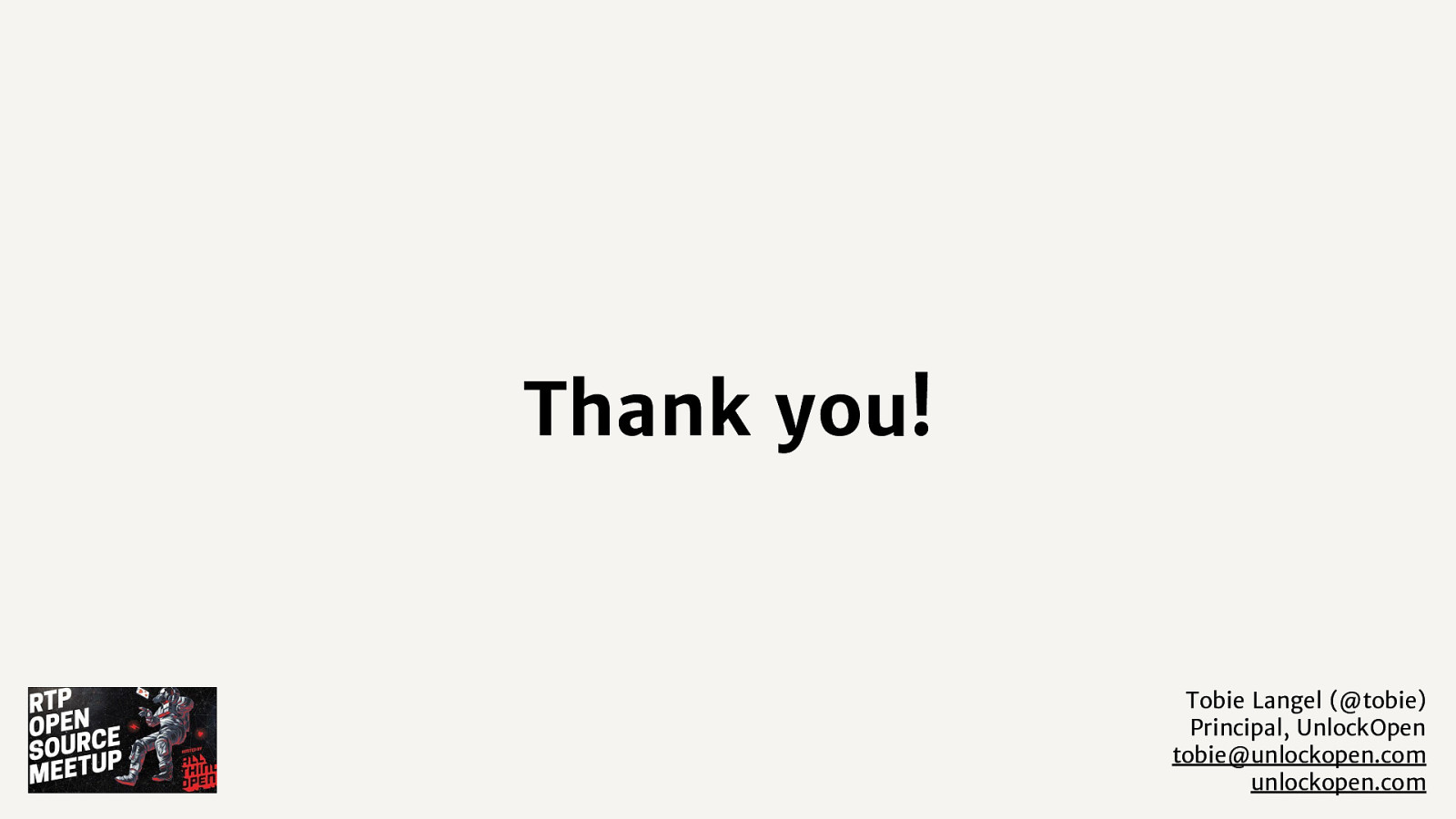
Thank you! Tobie Langel (@tobie) Principal, UnlockOpen tobie@unlockopen.com unlockopen.com
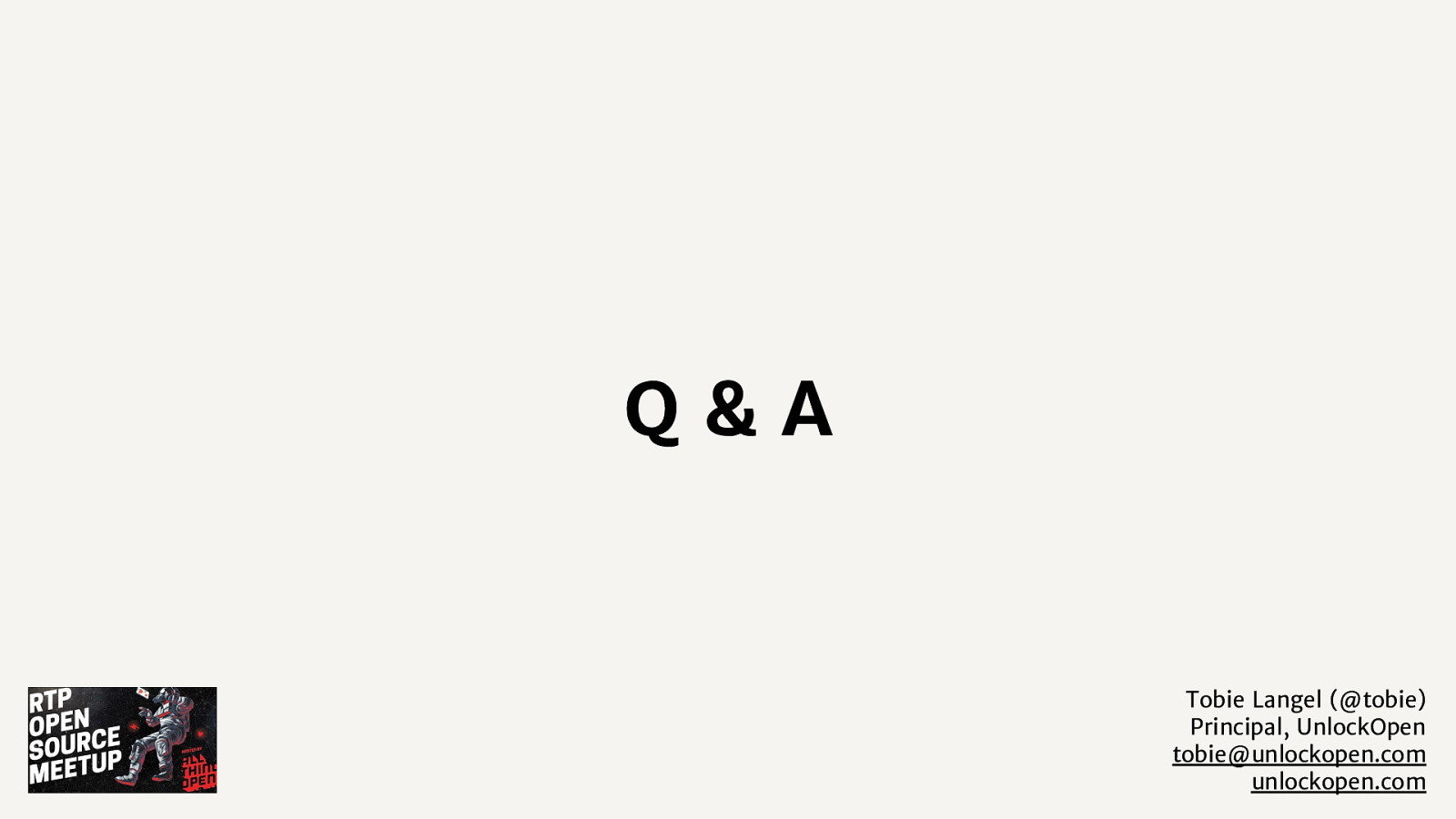
Q&A Tobie Langel (@tobie) Principal, UnlockOpen tobie@unlockopen.com unlockopen.com
The first open source practitioners were fueled by passion and a sense of purpose. As open source has both professionalized and become more mainstream, this has obviously changed. While the open source ethos and the desire to contribute to the commons may still be very much alive, there are also much more pragmatic considerations at play.
And that’s OK.
In this talk, we’ll look at how—both on an individual and organizational level—contributing to open source can be tied to career and business objectives while still being aligned with community values and culture. We’ll consider the positive impact that open source can have on individual careers, how this impact is still very unevenly distributed, and what important role employers can play to correct this. We’ll then dive into the more strategic benefits that building a strong open source culture can provide to corporations, and how what once appeared to be the realm of hackers, tinkerers, and activists can now also be a huge competitive advantage leveraged by companies of every size across all verticals.
